#howard irving young
Text
In 1949, a playboy CIA agent and his female assistant went to Alaska to investigate UFO sightings and also had to deal with Russian KGB Agents. ("The Flying Saucer", flm)

#nerds yearbook#sci fi#sci fi movies#1949#flying saucer#ufo#seti#mikel conrad#howard irving young#c.i.a#cia#kgb#k.g.b.#mike trent#pat garrison#hantz von teuffen#earle lyon#lester sharpe#russell hicks#frank darien#denver pyle#roy engel#garry owen#virginia hewitt#george baxter#philip morris#robert boon
4 notes
·
View notes
Text
Midnight Pals: Headless Horseman
Mary Shelley: sup fuckers
Poe: oh hi mary
Poe: you're just in time
Poe: washington irving's telling a story tonight
Shelley: w
Shelley: washington irving?
Poe: yeah
Poe: something wrong?
Shelley: [blushing furiously] n-no
Washington Irving: [lighting pipe] ba ba ba ba boo
Irving: hey old man good to see you
Irving: hope you're all enjoying this little shindig
Irving: now let the ol' groaner take a whirl with a story
Irving: submitted for the approval of the midnight society
Irving: i call this the tale of the headless horseman
Irving: ba ba ba ba boo
Mary Shelley: hi irvine
Irving: ahh it's ol' Mary Shelley
Irving: nice to see ya, old man
Shelley: did you
Shelley: did you get my letter
Irving: [lighting pipe] ba ba ba ba booo
Irving: ba ba ba ba boo
Irving: let the ol' groaner give out a helping of that new american jive
Irving: the legend of sleepy hollow to be exact, so make it mella, fella
Shelley: hiiii irvine
Irving: give me some space, son, you're bothering me
Shelley:
Shelley: o-ok
Lovecraft: w-what's wrong? ain't you gonna shiv him?
Shelley: shut up howard
Lovecraft: well it's just that usually when someone gives you the brush off
Shelley: no one gave me the brush off
Lovecraft: washington irving just-
Shelley: [shivving lovecraft] NO ONE GAVE ME THE BRUSH OFF
King: what's with mary tonight? she's acting real strange
Poe: oh she likes washington
Shelley: s-shut up
Shelley: shut up all of you
Shelley: I'll shiv each and every one of you if you don't shut up!
Poe: it's kind of cute
King: oh yeah, young love
Washington Irving: clip clip and a clippetty clop
Irving: he's out lookin' for a head to swap
Irving: so don't try to figure out a plan
Irving: you can't reason with a headless man!
Shelley: god he's so fucking hot
#midnight pals#the midnight society#midnight society#stephen king#edgar allan poe#hp lovecraft#mary shelley#washington irving
173 notes
·
View notes
Text
New episode!
Script below the break
Hello and welcome back to the Rewatch Rewind! My name is Jane, and this is the podcast where I count down my top 40 most frequently rewatched movies in a 20-year period. Today I will be discussing number 22 on my list: RKO’s 1938 screwball comedy Bringing Up Baby, directed by Howard Hawks, written by Dudley Nichols and Hagar Wilde, based on a story by Hagar Wilde, and starring Katharine Hepburn and Cary Grant.
Paleontologist David Huxley (Cary Grant) has a lot going on. He’s about to marry Alice Swallow (Virginia Walker). The final bone to complete the brontosaurus skeleton he’s been assembling for four years has just been found. And the wealthy Mrs. Carlton Random (May Robson) is considering a million-dollar donation to his museum. But while David is golfing with Mrs. Random’s lawyer, Alexander Peabody (George Irving), his ball gets mixed up with that of zany, scatterbrained Susan Vance (Katharine Hepburn), who leads him on a series of misadventures involving wardrobe malfunctions, a thieving dog, trouble with the law, and two leopards.
When my mom was starting to introduce me to Old Hollywood, she got Bringing Up Baby from the library and said something along the lines of, “I don’t particularly like this one, but you probably will.” And, um…that was an understatement. I was obsessed with this movie in my early teens. Like, to an embarrassing degree. I quoted it constantly. For example, whenever there was a curb or other uneven surface, I had to walk along it with one leg higher than the other in reference to the part when Susan loses the heel of one of her shoes and says, “I was born on the side of a hill.” I’m pretty sure I had watched it a few times in 2002 before I started keeping track; then I saw it five times in 2003, twice in 2004, and three times in 2005. And then as I got older, I started to cringe about my initial enthusiasm, and to listen to people I knew who didn’t like it. I watched it once in 2008, once in 2013, once in 2014, once in 2016, and then I decided I liked it again, so I saw it twice in 2018, twice in 2021, and once in 2022.
This movie flopped in its initial release, but its reputation has grown over the years, and it’s now generally considered to be the definitive screwball comedy, one of the greatest comedic films ever made, and according to some, one of the greatest films of all time of any genre. And yet, many of the people I know in real life who have seen it don’t like it – apart from my brother; I could always count on him to watch it with me. I think a lot of people find it too unhinged and chaotic and frustrating – and, to be fair, they are correct in that assessment. But it happens to be unhinged and chaotic and frustrating in all the right ways for me. I totally get that it’s not for everyone, and I think it does tend to be over-praised now, perhaps to overcompensate for the lukewarm response it generated in 1938. Back then, Howard Hawks attributed the box office failure to the fact that there were no normal characters in the film, so there was nobody for the audience to identify with. And maybe that is the problem. Perhaps the people who don’t like this movie are too normal for it, and the reason I enjoy it is because I have never been normal.
I think especially when I was young, I saw a lot of myself in both David Huxley and Susan Vance, even though they are pretty much opposites. David is mild-mannered and socially awkward, which is how I tend to be around people I don’t know very well. He also has a fairly passive role in the story; lots of things happen to him, while he’s unwillingly along for the ride, and that was definitely how I perceived my life at the time when I was most into this movie. Susan, on the other hand, is outgoing and self-assured when she shouldn’t be, and she frequently prattles on to the point of obnoxiousness, which is how I tend to be around people I’m comfortable with – again, even more so when I was younger. The fact that I’m basically a combination of the two leading characters is not something I consciously noticed until recently, but I think it explains a lot. Like why I find this movie comforting when it seems like I should find it irritating. I truly cannot overemphasize how ridiculous this movie is. Nothing about it makes any sense, which normally would bother me, but the thing is, it’s clearly not supposed to make sense. David refers to his skeleton as a brontosaurus, when at the time most paleontologists considered them the same as an apatosaurus (although recently that’s been called into question again). The final bone he’s waiting for is the “intercostal clavicle” which would be a shoulder bone in between the ribs, which…is not a thing in any animal that I know of. And the main leopard, Baby, is introduced to the story because Susan’s brother sent him to her from Brazil, which means either the brother or the leopard was very lost, since leopards are native to Africa and Asia. These factual errors introduced early in the story help set the tone for the nonsense that’s about to ensue, and oh boy is there a lot of nonsense. I mean, not that there isn’t a story at all; there definitely is, and the plot is relatively easy to follow. It’s just absolutely bonkers. Nobody would wind up in jail for trying to get a leopard off a roof, after mistaking it for a different leopard. But it’s very funny to see what would happen if they did. Ultimately, this movie is just trying to be a comedy, and it very much succeeds at that. Most of the movie is witty dialogue between wacky characters in ridiculous situations – basically my favorite brand of humor. There is also excellent physical comedy, including lots of falling down, which normally I’m not a huge fan of, but for some reason this movie’s brand of falling humor works for me. It’s a fun silly movie that is clearly not meant to be taken seriously. And I would argue that its central romance isn’t meant to be taken seriously either.
Because this movie has a male and a female lead, predictably they end up together. But the thing is, I don’t believe that David and Susan truly have romantic feelings for each other. After they have run into each other a few times, Susan asks a psychiatrist she’s stumbled upon what he would say about a man who follows a woman around, and when she talks to him, he fights with her. Now, this is an extremely inaccurate representation of what has been happening – first she took over his golf ball, then she stole his car, then she dropped an olive causing him to slip and fall on his hat. He’s not just randomly picking fights with her; he has reasons to be upset with her. But based on what she said, the psychiatrist tells her, “The love impulse in men frequently reveals itself in terms of conflict.” That leads Susan to conclude that David must be in love with her, and she then decides that she is also in love with him. Which very much sounds like the behavior of someone who does not understand romantic attraction. Throughout the rest of the movie, Susan keeps coming up with ways to prevent David from leaving, which she thinks is because she’s in love with him, but comes across to me as a lonely person desperate for a friend. David spends most of the movie trying to get away from Susan. He does help her resolve some of the situations that she gets herself into, but mostly because she’s either tricked or trapped him. At one point, he tells her, “In moments of quiet, I’m strangely drawn toward you, but there haven’t been any quiet moments,” implying that he is not, in fact, drawn toward her at all. He does care about her wellbeing in spite of himself, but that doesn’t automatically imply romantic feelings. At the climax, when David is trying to fight off the wild leopard that has been mistaken for the tame Baby, he urges Susan to run, and she says, “No, I won’t leave you, I love you!” and he just responds with an unpleasantly shocked, “WHAT?!” Granted, at the end, David confesses to Susan that in hindsight, the time he spent with her was the most fun he’s had in his whole life, to which she replies, “That means you must like me a little bit,” and he says, “It’s more than that! I love you, I think!” But then she accidentally breaks the dinosaur skeleton that he’s spent four years working on, and before he recovers his power of speech, she says, “Oh, David can you ever forgive me? You do? And you still love me!” and she embraces him, and he just goes, “Oh dear,” and hugs her back, and then the movie ends without even remotely convincing me that they’re really in love. I think the psychiatrist’s suggestion combined with amatonormativity has convinced them that they were thrown together by fate and destined to fall in love, so they decided that that was what had happened without really feeling it. The characters strike me as being better suited for friendship than romance, and I hope they discover that after the events of the film. I can see them meeting up every once in a while for more absurd adventures, but I feel like they would destroy each other if they tried to live together.
Now, could this all be me projecting my aromanticism onto these characters so I could relate to them even more? Absolutely. But there’s something indisputably queer about this movie that is definitely not all in my head. These characters are just so fascinatingly quirky that they can’t possibly all be straight allos. Apparently the script had scenes of David and Susan declaring love for each other in the middle that Howard Hawks cut during production, which implies that the director agreed with me that the leads weren’t intended to be too into each other that way. And of course, there’s That One Line. If you’re at all familiar with this movie, you probably know the one I mean, but for those who don’t: after they take Baby the leopard to Susan’s aunt’s country house in Connecticut, Susan convinces David that he needs to take a shower before he can go back to New York to marry his fiancée, and while he’s bathing she takes his clothes and sends them into town to be cleaned, so David won’t be able to leave. When he gets out of the shower, he has nothing to put on but a frilly woman’s bathrobe. Then Susan’s aunt (who also happens to be Mrs. Carlton Random, but he doesn’t know that yet) enters the house and asks who he is, to which he replies, “I don’t know, I’m not quite myself today.” And then when she demands to know why he’s wearing the feminine robe, he can’t come up with a good explanation, so he bursts out, “Because I just went GAY, all of a sudden!” This was an ad-lib by Cary Grant that somehow made it into the film and is now probably its most famous line. At the time, the word “gay” was being used by the homosexual community to refer to themselves, but that use had not entered mainstream consciousness yet, obviously, or the censors wouldn’t have allowed it in the movie. Most uses of “gay” in old films were clearly meant in the “lighthearted, carefree” sense, or were at least ambiguous enough that they could mean that, but in this context, that definition doesn’t really make sense. I don’t like forcing labels onto real people, but it does seem like Cary Grant was probably bisexual, and therefore it’s reasonable to assume that he would have been familiar with the less common definition. Of course, David is saying this sarcastically; he’s wearing the feminine robe because that was the only thing available to wear when he got out of the shower – it has nothing to do with his sexuality or gender presentation. But the idea that the character would be familiar with that use of the word “gay” raises some interesting questions.
In addition to Cary Grant, it’s also been widely speculated that Katharine Hepburn was not straight. She certainly was at least somewhat gender-nonconforming, frequently wearing pants at a time when that wasn’t socially acceptable for women. Susan Vance is one of her more feminine-dressing characters, and she doesn’t say anything about being gay, but right after that scene, when she hears that David is looking for clothes in her brother’s old room, she cries, “If he gets some clothes, he’ll go away, and he’s the only man I’ve ever loved!” I’m told that making it to 30 without having loved someone of the opposite sex is not a typical straight, alloromantic experience. So even if my initial theory is wrong and David and Susan are attracted to each other romantically, that doesn’t rule out the possibility that they’re some form of queer. And as for David’s fiancée, Alice, she’s not in much of the movie, but she makes it clear that her marriage to David is going to be more of a business arrangement than a romance. She has no interest in a honeymoon or children, insisting that the dinosaur skeleton will be their child, and like, I know she was probably meant to be a stereotypically frigid geeky girl with glasses, and it’s harmful to imply that women can either have brains or heart, but at the same time “why would we need to have sex when we have a dinosaur skeleton” is such an iconic ace attitude that I can’t help but admire her. Anyway, she breaks up with David after Mrs. Carlton Random finds out who he is and decides not to donate her million dollars to a museum that employs someone as unhinged as him, but I hope Alice finds happiness, preferably with another asexual dinosaur enthusiast. Most of the other characters also seem at least somewhat queer – Constable Slocum and his assistant Elmer kind of seem like they’re in a relationship with each other, for instance, and Major Applegate doesn’t seem very straight either. All of this might have been completely unintentional, but what the heck, in honor of Pride month, I’m declaring that every character in this movie is somewhere under the LGBTQIA+ umbrella. This is my podcast and I make the rules.
Bringing Up Baby was reportedly very difficult to make. Production ended up taking 40 days longer than scheduled and costing $330,000 over budget. Part of that was because Cary Grant and Katharine Hepburn kept cracking each other up and ruining takes, and because Howard Hawks had a fairly leisurely attitude on set, sometimes cancelling shooting early to take the cast to the races. They also had to deal with animals, which is always tricky. In modern films there are usually multiple animals playing the same character, but in this movie they only had one Leopard, named Nissa, who played both Baby and the vicious circus leopard. Katharine Hepburn seemed to enjoy working with the leopard, and she wasn’t afraid of it even though it did almost attack her at one point. But Cary Grant was terrified of Nissa, so most of his scenes with a leopard were either filmed with his stand-in, or his part and the leopard’s part were filmed separately. The visual effects were fairly advanced for 1938, and even though you can sometimes tell that the actors and the leopard weren’t actually together, it works well enough that you won’t really notice unless you’re watching for it. There’s also a dog named George who steals and buries the intercostal clavicle, and that dog was played by the famous Skippy, who had also played Asta in the first few Thin Man movies and appeared in a different Cary Grant movie called The Awful Truth. I haven’t heard any stories about how Skippy behaved on the Bringing Up Baby set, but I assume he was very professional.
Although the film’s box office failure did nothing to help Katharine Hepburn’s floundering film career in the late 1930s, I personally feel like it represents a significant turning point in her acting abilities. There’s a staggering difference between her pre-Bringing Up Baby performances and her post-Bringing Up Baby performances. Early in her career she was extremely overly dramatic, and while some of those films were still fairly good, many are painfully unwatchable. The story goes that initially, she wasn’t very good as Susan Vance either. She kept trying too hard to be funny, which ruined the comedy. Unable to get through to her himself, Howard Hawks asked Vaudeville veteran Walter Catlett to show her what she was doing wrong, and Hepburn found him so helpful that she asked Hawks to cast him in the movie so he’d be around to give her more pointers. So Walter Catlett played Constable Slocum, and Katharine Hepburn learned how to do comedy. Her character is relentlessly annoying and over-the-top ridiculous, but Hepburn commits. The knowledge that she needed help to get there in no way detracts from the brilliance of her performance. She plays everything Susan does as if it’s the most logical, natural thing in the world, and that’s what makes the movie work. If Susan was aware of how silly she was, the whole thing would have fallen apart. We all know that I love Cary Grant, and I do greatly enjoy his performance here, too, and I think they play off each other very well, but I feel like it’s mainly Hepburn’s performance that has compelled me to keep revisiting this film. As a young person, I related to certain things about Susan and wished I could be as carefree and self-assured as she was, although maybe a little less obnoxious. Now I relate to her less – I wish I had half her energy – but I still find her antics amusing. And it’s also fun to see how much better her acting got after this movie. Clearly she took Catlett’s lessons to heart, and combined them with her natural talent and determination and hard-working spirit to fully become the force to be reckoned with that she’s remembered as.
There is so much more I could say about Bringing Up Baby, like how much I love the scene when Susan pretends to be a gangster to get out of jail, but I’m worried I would just end up quoting the whole movie if I kept going, so I think I’ll wrap it up here. Thank you so much for listening, whether you love this movie, hate this movie, don’t have a strong opinion about this movie, or have never seen this movie. I appreciate you all so much! This will be my last solo episode for a while, as I have guests lined up for the next three episodes, so stay tuned for some fun conversations. Next up is the fifth and final film I watched 19 times while keeping track. As always I will leave you with a quote from that next movie: “A date! What’s a date?”
#bringing up baby#cary grant#katharine hepburn#howard hawks#the rewatch rewind#tldr nobody in this movie is straight
12 notes
·
View notes
Text
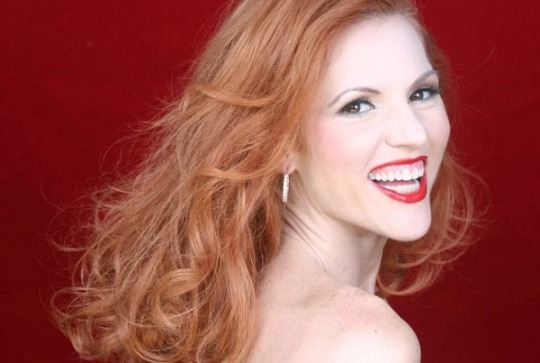
Quinn Lemley
Through Rita Hayworth - The Heat is On, Singer/Performer Transforms Into the Legendary Star
by Brad Balfour
On Nov 20, 2023, the singer/style queen Quinn Lemley will present her last NYC performance of The Heat Is On! – Rita Hayworth at Don’t Tell Mama (343 W 46th St.), the long-established cabaret center in midtown Manhattan, before going on the road. Hayworth, known as “The Love Goddess,” is iconic for her indelible performance in Gilda, the film noir classic – performing the sexiest striptease on celluloid, “Put The Blame On Mame.” The hottest sex symbol of the 1940s, Hayworth’s pin-up on the Atomic Bomb gave her the international title of “The Atomic Star.” Courted by the world’s most powerful men – Orson Welles, Prince Aly Khan, and Howard Hughes among others – Hayworth was a legend until she had early onset Alzheimer’s Disease which led to her death.
Fire-haired performer Lemley brings the star to life in her sold-out shows. Having headlined various performing arts centers and casinos across North America, she received The Bistro Award and two MAC award nominations. Lemley’s jazz quintet performs internationally and she’s the iconic face of the Half Note in Athens, Greece. The New York Times defines her performances as "Dazzling... with one show-stopping number after another!"
Besides this show, Lemley has directed and co-produced Rebel Rebel, The Many Lives of David Bowie, Pink Floyd’s Dark Side of the Wall and The Ultimate Queen Celebration. She’s had a presence on national TV through appearances on Good Morning America, Oprah and as a finalist on Shark Tank. Lemley also has five CDs available, and her music is on Spotify and Apple Music. She’s hosting the locally produced TV show, Secrets of the Stage on MNN.org with a monthly virtual concert on Zoom -- “Up Close & Personal.” A graduate of NYU Tisch School of the Arts, she's a Distinguished Toastmaster at Toastmasters International and a member of National Speakers Association as well as SAG, AFTRA, AEA, DTM, NSA NY, APAP, and IEBA.
This critically acclaimed concert about Hayworth's life — the star who built Columbia Pictures — is a humorous, heartfelt and heartbreaking look at The Golden Age of Hollywood, the MeToo movement and the price of fame — especially in light of Hayworth's tumultuous relationship with the head of Columbia, the infamous Harry Cohn. The show reflects the price of fame, celebrating a remarkable life with humor, wit and impeccable storytelling. It’s all woven together with tunes from The Great American Songbook and the Golden Age of Hollywood.
Written and directed by Carter Inskeep (“Always Patsy Cline”), Lemley’s performance is either backed by a quartet or by an 11-piece big band. The show includes hits from such legendary composers and lyricists as Irving Berlin, Harold Arlen and Jerome Kern. It includes “Bewitched,” “Zip,” and “The Lady is A Tramp” from such iconic films as “Gilda,” “Pal Joey,” “Cover Girl” and more.
The following Q&A was conducted online in advance of the upcoming show.
When did you know you wanted to be a performer?
I came out of the womb entertaining. I’ve always known that I wanted to perform. Singing and acting have always been my passion. Even as a young girl from Indiana I was always producing puppet shows, carnivals and musicals for our neighborhood. Luckily, my parents were incredibly supportive and made sure I took lessons and classes. I’m so grateful today!
Talk about the first time you performed. Can you describe the moment?
My first show was when I was in fifth grade. I played a Far-Out Foxy Lady from A Foreign Land in Whitecloud and the Seven Dwarfs. I guess I was bound to be a glamour gal from the get-go!
Have you focused on cabaret because of the intimacy of the experience?
I love cabaret. I love its intimacy. It’s taught me to connect to each and every person in the room. It provides an opportunity to try things out and to take a chance, to take risks.
Although it’s been a big part of my life, I haven’t focused on cabaret. My late husband -– producer, manager and best friend, Paul Horton -- expanded my shows by putting them with 9- to 12-piece big bands. That opened up the scope of our shows. For the past 15 years, I’ve been headlining casinos and performing arts centers like The Kravis Center, Naples Philharmonic, Thousand Oaks Civic Center and BB Kings in NYC. After Covid, Paul suggested I go back to the club where I started my career -- Don’t Tell Mama in NYC -- before going back on the road in theaters. We won the Bistro Award, a MAC Nomination, rave reviews and have enjoyed a 17-month residency. I’m grateful Paul booked these dates leading up to going back to theaters starting in North Carolina at the Tryon Center Nov. 4, The Pheasantry in London on Feb 16 & 17th, and a one-week run at The Cape May Playhouse in July. We have our last NYC date on Monday, Nov. 20 at Don’t Tell Mama. It’s given me a chance to heal and put myself into the performance on another level.
How do you choose the songs you do?
First, it’s the lyrics. What am I trying to say? How do I want to say it? Where does it fit into the show? Secondly, it’s about melody and structure. How does the melody make me and the audience feel? How do I want it arranged to tell the story? Finally, does it fit me as an artist? I love all kinds of music. But like clothing, not everything fits with my voice and personality or belongs in the arc of the story that I’m telling. I have to try the songs out and see how they feel and sound in my voice.
How did you develop this show?
Rita Hayworth – The Heat Is On! has had three stages of development. The first stage was when I got out of NYU. I was starring in a show off Broadway. A reviewer saw me and said, “You look like Rita Hayworth. You should meet Carter Inskeep and do the story of her life.” That was pre-internet, so we read every biography, watched her films on tape and went to the library. We also read every article we could find on microfiche. The question we kept asking was, “Who is Rita Hayworth – the public persona? But more importantly, who is Margarita Cansino? The girl who has hopes and dreams and just wants to be loved?” Just like me, like all of us. We had tremendous success, got rave reviews, were on Oprah, Geraldo, Good Morning America. I was in my mid 20s then. In my 30s, I met Paul Horton. He changed my life. He had us rewrite the show, using the songs from the Great American Songbook during the Golden Age of Hollywood to help tell the story instead of limiting it to songs from Rita’s films. He had it orchestrated for both a big band and a quartet. Now we can play intimate theaters as well as large ones like The Kravis Center, Naples Philharmonic and BB King’s. We toured throughout North America. During Covid, Carter rewrote the book to make the story about resilience, accepting our choices with topics like the “Me Too” movement, women’s empowerment and the price of fame. He had us return to Don't Tell Mama’s in NYC where we started the show after COVID, before going back on tour in theaters. Our residency was so successful that we got extended from four to 17 months, had rave reviews, won the Bistro Award and got a MAC Nomination.
Besides this one performance left in NYC on Monday, Nov. 20, I’m going to London in February at The Pheasantry. I am so grateful that Paul put this in motion. It's been a lifesaver since he unexpectedly passed in March. It was his vision to do this residency. The story is so rich, deep, funny and moving. I’ve been able to tap into Rita’s story on a deeper level than I ever could have when I was younger. I’ve been able to put myself into the role in a way I never dreamed was possible. And the audiences are responding.
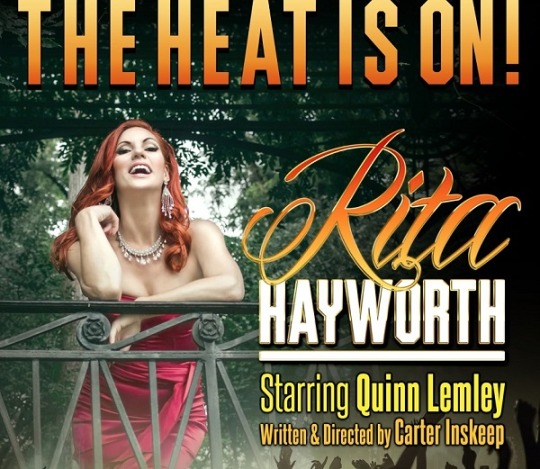
Do you try to make your shows thematic, or sometimes just a simple revue?
All of my shows are thematic. The Heat is On – Rita Hayworth is about Rita and The Golden Age of Hollywood. Burlesque to Broadway is about the women who went from Burlesque to Broadway and Beyond. As a director and producer, I've done these shows: The Ultimate Queen Celebration, Rebel Rebel: The Many Lives of David Bowie and Pink Floyd’s Dark Side of the Wall. My TV Talk show on MNN, Secrets of the Stage is where I pull back the curtains and explore the creative process. My speaking keynote is about resilience through the lens of my relationship with my shows Rita and Burlesque to Broadway.
You did have a burlesque moment. Did it feel liberating, powerful or what?
I did a show called Burlesque To Broadway. It was so liberating. I was onstage with four beautiful and talented women who celebrated their talent, beauty and humor. It was powerful to claim and own my femininity and fun to tease. As the great poet Mel Brooks said, “When You Got It, Flaunt It.” Every woman should step into her power and “Be”!
Besides the songs you're already playing, what are your benchmark tunes?
My heroine is Julia Child. I got to have lunch with her at her house in Cambridge with her husband Paul. Her spirit was incredible. She was a woman who took massive action and didn’t let anyone or anything stop her. Other icons of mine are Cher, Ann-Margret, Lady GaGa and Diana Ross. I’m putting a list of songs from '70s and '80s rock, so my benchmark songs are "The Show Must Go On," "You Take My Breath Away" and "Rock and Roll Suicide." I perform Queen and Bowie plus others to celebrate my late husband, Paul’s genius and talent. Plus, “Don’t Fret World” from his Rock Opera which was his anthem.
Who would you like to perform with or what show would like to be in?
My dream is to work with the French artist, arranger and producer Benjamin Biolay. And, of course, I’d love to work with David Foster.
What goals do you have for this show and for yourself?
We are going back on the road in theaters. I’m on a plane now headed to Tryon Arts Center in North Carolina. Going to London. I’m hoping to find producers and promoters who will help us tour and produce a run on the West End of London. I’d like to do a national tour. We’d also like to do a NetFlix special filming of the show for broadcast. Paul was my agent as well as producer, so I need to find an agent that can help me internationally. I am also looking to get my TV show, Secrets of the Stage, picked up by a major network with sponsorship. As a director and producer, I’m working on our tour of The Ultimate Queen Celebration with Yvan Pedneault and MiG Ayessa, both endorsed by Queen. It’s the best Queen tribute band on the market. We will be at The Egg in Albany, May 11th, and are routing around that. The audiences are on their feet. It's a Queen party.
Starting next month, I’m working on a new show with ’70s and ‘80s rock that’s a tribute to Paul and our incredible 20-year journey together through music. I’m grateful to have so many talented colleagues with me on my journey.
Who: Quinn Lemley
What: "Rita Hayworth - The Heat is On!"
When: November 20th, 2023
Where: Don’t Tell Mama – 343 W 46th St. – New York, NY – (212)-757-0788
For more info go to: www.QuinnLemley.com
Copyright ©2023 PopEntertainment.com. All rights reserved. Posted: November 15, 2023.
Photos ©2023. Courtesy of Quinn Lemley. All rights reserved.
youtube
2 notes
·
View notes
Photo

Hud (Martin Ritt, 1963)
Cast: Paul Newman, Melvyn Douglas, Patricia Neal, Brandon De Wilde, Whit Bissell, Crahan Denton, John Ashley, Val Avery, George Petrie. Screenplay: Irving Ravetch, Harriet Frank Jr., based on a novel by Larry McMurtry. Cinematography: James Wong Howe. Art direction: Tambi Larsen, Hal Pereira. Film editing: Frank Bracht. Music: Elmer Bernstein.
Like a lot of very good pictures, Hud sometimes has the feeling of having been made at the wrong time in film history. It's still hamstrung a little by the moribund Production Code: Characters in it say things like "crap" and "crud" instead of "shit." But it was the exact right time for the actor who played Hud. Paul Newman was just on the cusp of turning 40, an age when vitality can curdle into meanness. The character himself becomes an embodiment of the film's central theme: the passing of a way of life. Think of the hopefulness of the cattle drivers in Howard Hawks's Red River (1948) as compared with the sour fate of the Bannons in Hud. The mantra of Red River was Dunson's "Good beef for hungry people. Beef to make 'em strong, make 'em grow." In Hud it might be Homer Bannon's "It don't take long to kill things, not like it does to grow." But mostly the strength of Hud is in the performances: Newman's obviously, and Patricia Neal's as Alma, but most especially Melvyn Douglas's as Homer, when you remember Douglas as the actor who wooed Irene Dunne in Theodora Goes Wild (Richard Boleslawski, 1936), Marlene Dietrich in Angel (Ernst Lubitsch, 1937), and Greta Garbo in Ninotchka (Lubitsch, 1939). The movie won Oscars for Neal and Douglas, as it should have. Only Brandon De Wilde's performance didn't quite work for me: He seems a little too soft and well-scrubbed for someone who grew up in a landscape as lean and hard as the one James Wong Howe's (also Oscar-winning) images display. We have to think of the randy teenagers in The Last Picture Show (Peter Bogdanovich, 1971), also based on a novel by Larry McMurtry, to see what the character might really have been -- a young Jeff Bridges would have been wonderful as Lonnie Bannon.
1 note
·
View note
Video
youtube
Young People (1940) | Shirley Temple (last child star film) | Jack Oakie...
The movie, Young People, was Shirley Temple's last movie as a child star. It is still a great movie, in fact, Film Daily wrote, "Shirley Temple's latest and last offering for 20th-Century Fox is loaded with entertainment and finds the youngster as appealing and attractive as ever,: This is the full length film in origina. technicolor. Movie CAST Shirley Temple as Wendy Ballantine Jack Oakie as Joe Ballentine Charlotte Greenwood as Kit Ballentine Arleen Whelan as Judith George Montgomery as Mike Shea Kathleen Howard as Hester Appleby Minor Watson as Dakin Frank Swann as Fred Willard Frank Sully as Jeb Mae Marsh as Maria Liggett Sarah Edwards as Mrs Stinchfield Irving Bacon as Otis Charles Haltin as Moderator Arthur Aylesworth as Doorman Olin Howard as Station Manager Harry Tyler as Dave Darryl Hickman as Tommy Shirley Mills as Mary Ann Diane Fisher as Susie Bobby Anderson as Jerry Dakin You are invited to join the channel so that Mr. P can notify you when new videos are uploaded, https://www.youtube.com/@nrpsmovieclassics
0 notes
Text
All the Howard Family in Gacha Club
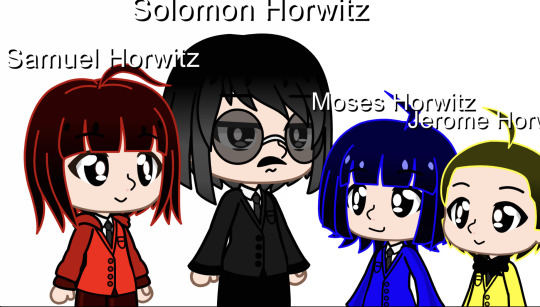
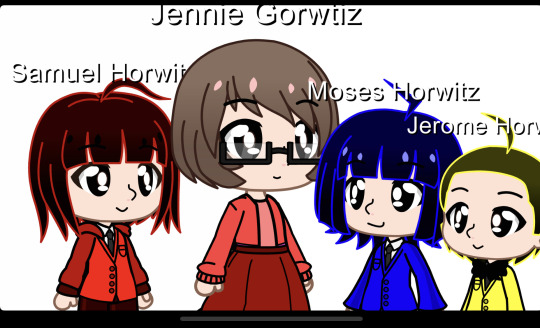
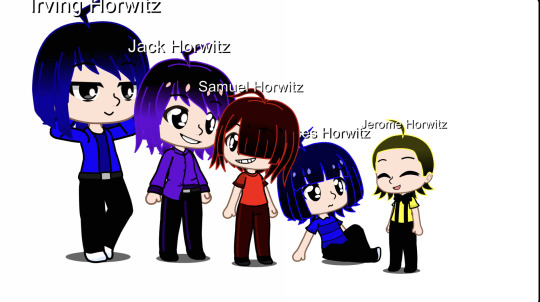
Also in the last Photo it’s the Horwitz Brothers When their young
Irving(13), Benjamin/Jack(11), Samuel/Shemp(7), Moses/Moe(5) and Jerome/Curly(1)
0 notes
Text
HERE COMES THE JUDGE!
Oyez! Oyez! All Rise for the Honorable Jurists of the Lucyverse!
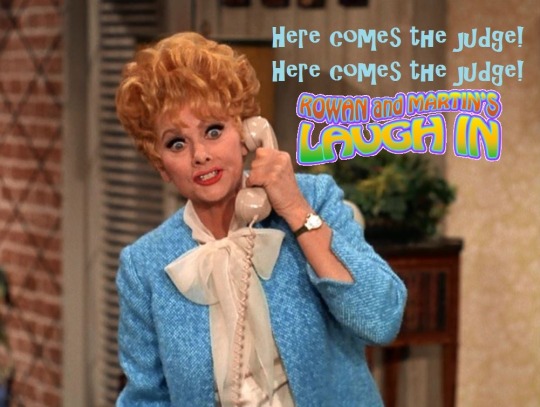
“Lucy the Conclusion Jumper” (1968)
APPROACH THE BENCH

Clarence Wilson played a Judge in one of Lucille Ball’s early films, Blood Money (1933). It was the first of three of his Judge roles.

C. Montague Shaw played the Judge in Jealousy (1934), a film in which Lucille Ball has a bit part. He also played a Judge (not the legal kind) in 1935′s Carnival, also with Ball, as well as eight more screen Judges!

Lucille Ball played a Beautician and Edward LeSaint played a Judge (both uncredited) in Fugitve Lady (1934). Of LeSaint’s more than 325 screen credits, more than 60 were as Judges; nine in 1939 alone. They included the cult classic Reefer Madness (1936) and a film titled A Woman is the Judge (1939).
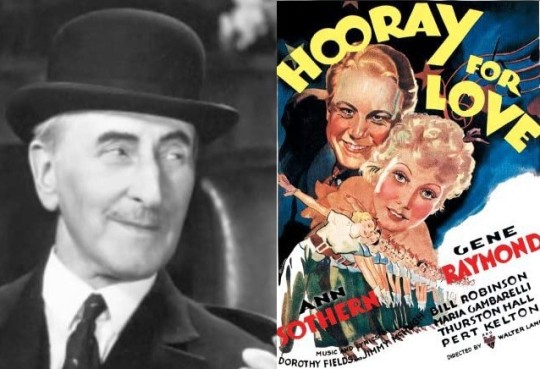
Etienne Giradot played Judge Peterby and Lucille Ball was an uncredited chorine in Hooray for Love (1935). He went on to play Judges in two more films.

Howard Hickman played 28 Judges from 1934 to 1941, including Judge Jonathan Travers in the Lucille Ball film Next Time I Marry (1938).

In 1940, Lucy and Desi’s elopement required two Judges! Probate Judge Harold L. Knapp waived the five-day wait required by Connecticut law, and Justice of the Peace John P. O'Brien performed the ceremony at the Byram River Beagle Club at noon on Saturday, November 30, 1940. Some aspects of the event were fictionalized on “I Love Lucy” in 1952 with Irving Bacon playing Justice of the Peace Mr. Willoughby.
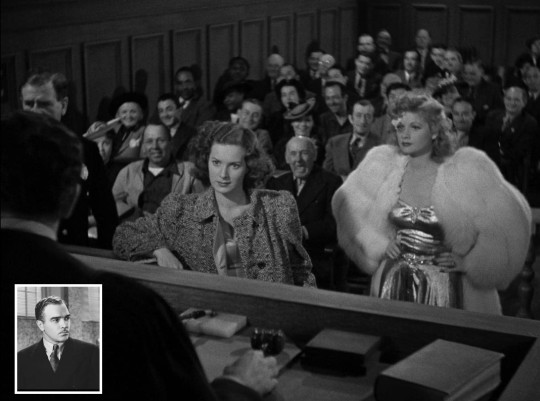
Walter Abel played the Judge in Dance, Girl, Dance (1940). In 1935, he was seen in the film The Three Musketeers with Lucille Ball. Abel also played a Judge in his final television role in 1976.
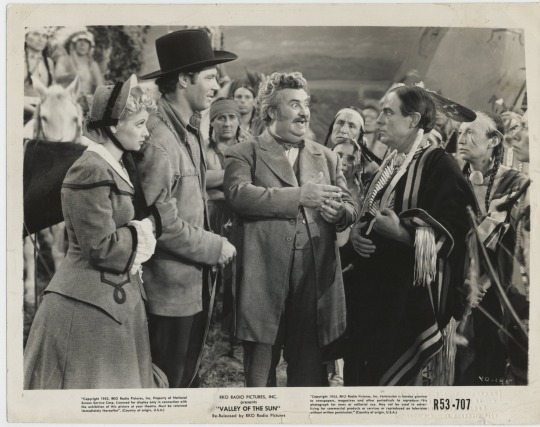
In Valley of the Sun (1942), Lucille Ball played Christine Larson and Billy Gilbert played Judge Homer Burnaby. Gilbert was also seen with Ball in I Dream Too Much (1938) and Joy of Living (1938).
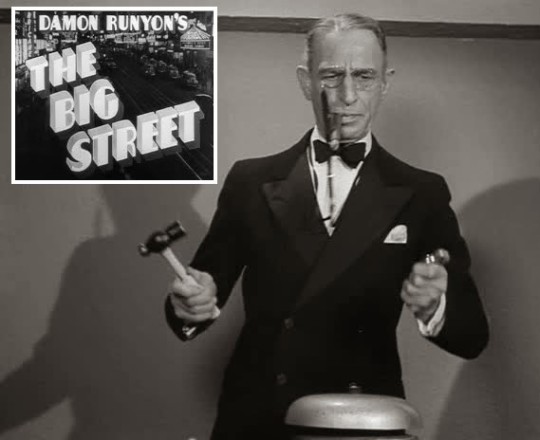
Also in 1942, Ball played the lead in The Big Street in which Julius Tannen played Judge Bamberger. He also played a Judge in The Lady in Question (1940).
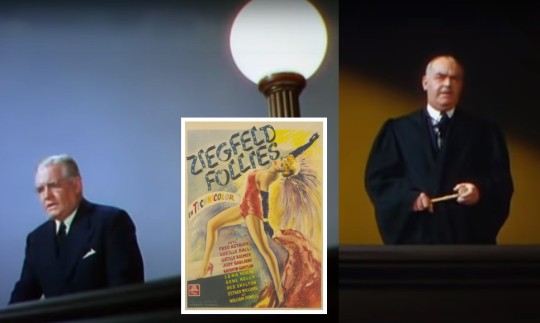
There were two Judges in the Lucille Ball film Ziegfeld Follies (1945), both in the segment titled “Pay the Two Dollars”. Judge #1 was played by Joseph Crehan, who later played the Detective in “The Great Train Robbery,” a 1955 episode of “I Love Lucy.” Of his 382 film and TV credits, more than a dozen were as Judges. Judge #2 was played by William B. Davidson, who was also seen with Ball in Roberta (1944) and Lover Come Back (1946). Coincidentally, Davidson’s final film was titled The Judge Steps Out (1948). He played a Judge in five films. One of his early films was titled Good Morning Judge (1928). The two Ziefeld Follies Judges do not appear in the same segment as Lucille Ball, “Here’s To The Ladies.”
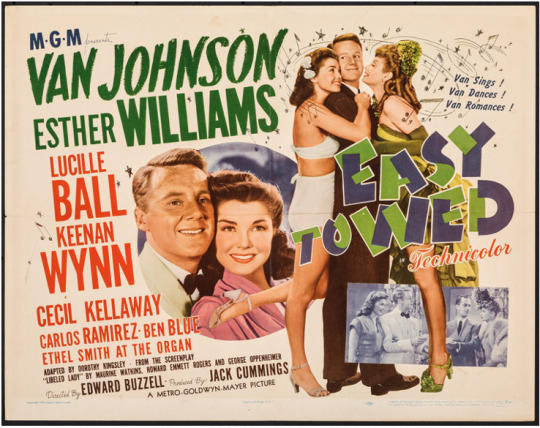
Walter Soldering and Joel Friedkin played Justices of the Peace (a Judge with limited jurisdiction, generally with the ability to perform marriages) in the Lucille Ball / Van Johnson film Easy To Wed (1946). Friedkin played a JOP in three other films and a Judge in eight! Soldering played four JOPs and six Judges.
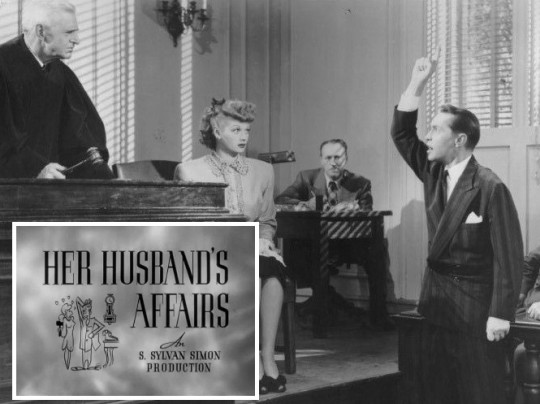
Selmer Jackson played the Judge in the Lucille Ball / Franchot Tone film Her Husband’s Affairs (1947). His first time playing a Judge was in the Jimmy Durante film Carnival (1935), in which Lucille Ball played a nurse. Twenty more Judge roles followed, including Mighty Joe Young (1949). Ball did the script for radio in 1949, although the actor playing the Judge went uncredited and unidentified.
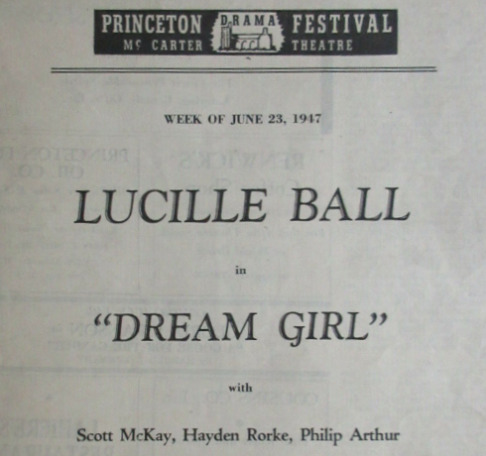
Edward Forbes played the Judge in Lucille Ball’s tour of the stage play Dream Girl (1947-48) which began in Princeton, New Jersey.

The film What My Next Husband Will Be was announced in June 1948 as a vehicle for Lucille Ball. It wasn’t long before Ball had been assigned to Miss Grant Takes Richmond (see below) and the role was recast with Rosalind Russell. The title was changed to Tell It To The Judge (1949) and Russell’s character was changed from a Broadway star, to a Federal Judge.
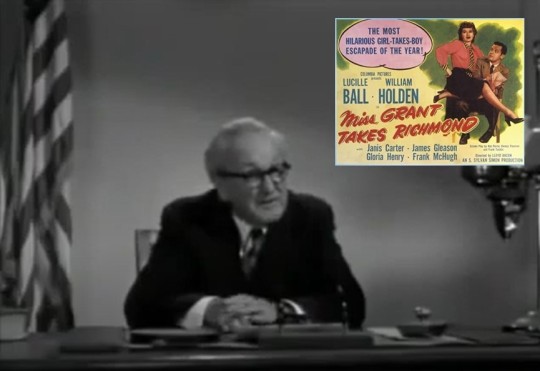
George Cleveland played Judge Ben Grant in Miss Grant Takes Richmond (1949) starring Lucille Ball and William Holden. The Judge is the uncle of Ellen Grant, the title character played by Lucy. This was Cleveland’s fifth film with Lucille Ball in four years. In 1954, Cleveland played a Judge on TV’s “Death Valley Days.”
IN RECESS
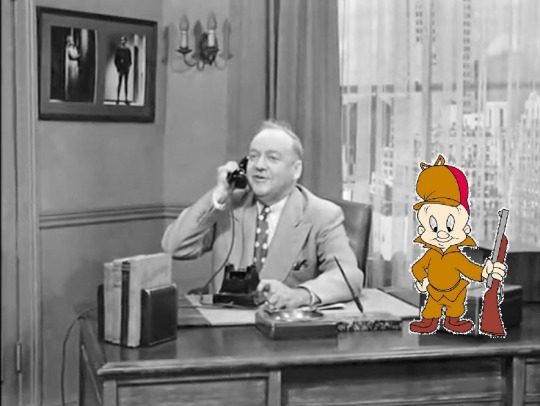
When Ball did Miss Grant on radio in 1950, the role of Judge Grant was taken by Arthur Q. Bryan, best known as the voice of Elmer Fudd. Bryan played Mr. Chambers, new owner of the Tropicana in “Ricky Loses His Voice” (1952).

Gale Gordon played Judge Skinner in the My Favorite Husband episode “Valentine’s Day” broadcast on February 11, 1949 on CBS Radio.
JUDGE: “There is no problem too big to solve. Into every life a little rain must fall. Every cloud has a silver lining, and it is always darkest before the dawn.”
LIZ: “Well now that we’ve had the weather report, let’s get on with the case!”
Lucy ended up appearing before another Judge played by Gale Gordon on “The Lucy-Desi Comedy Hour” (see below).
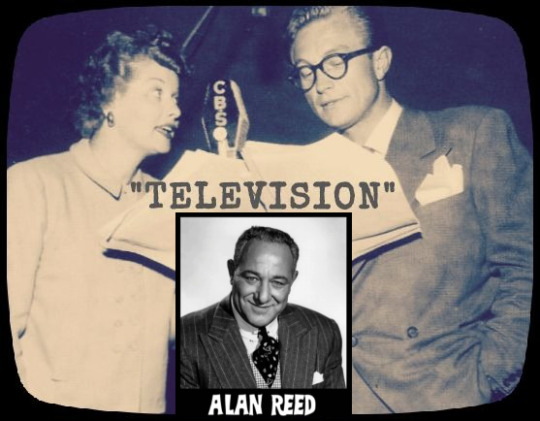
Alan Reed played Harry, the Judge in the My Favorite Husband episode “Television” broadcast on CBS Radio on June 17, 1949. Reed was best known as the voice of Fred Flintsone, but also appeared as a cafe owner in “Lucy Visits the White House” (1963).
FINAL ARGUMENTS
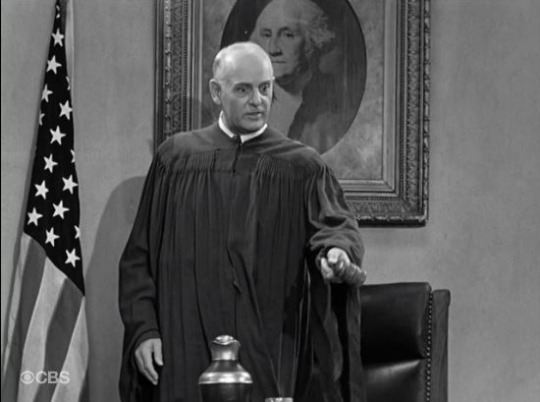
“Television” was the basis for the “I Love Lucy” episode “The Courtroom” (1952), in which the Judge was played by Moroni Olsen.
LUCY: “Well, Your Honor, now that I think of it, maybe it was Ricky who took the back off the set.”
JUDGE: “Really?”
RICKY: “Well, now that I think of it...yeah.”
Olsen played a Judge in three other films.
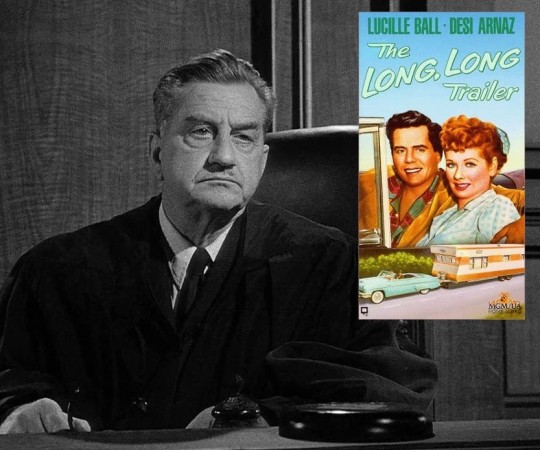
Fay Roop played a Judge in The Long, Long Trailer (1954). He also played a Judge on “Perry Mason”, “The Twilight Zone”, and several other TV shows and films.
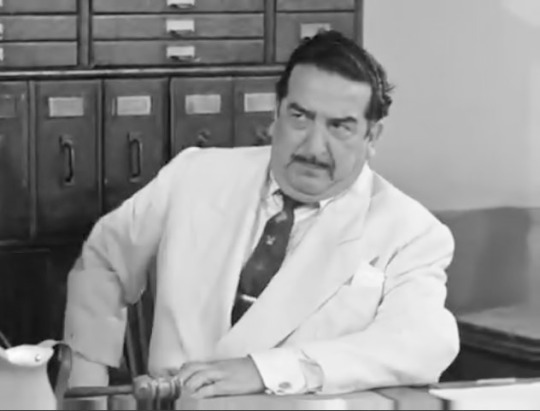
Jorge Treviño played a Judge in the very first episode of “The Lucy-Desi Comedy Hour” “Lucy Takes a Cruise to Havana” (1957). Treviño had played Ricky's Uncle Alberto when “The Ricardos Visit Cuba” (1956).
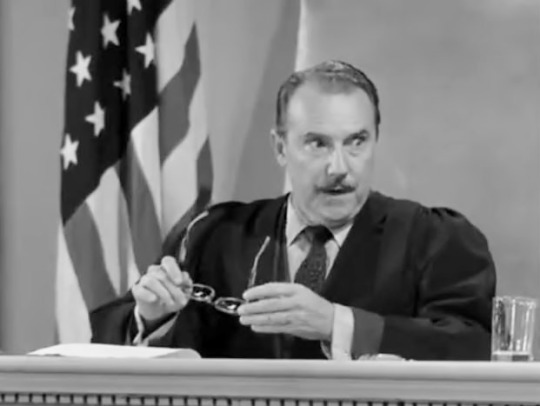
Gale Gordon played Judge Phillips in “Lucy Makes Room for Danny” (1958), an episode of “The Lucy-Desi Comedy Hour” which was a cross-over with “Make Room for Daddy.”

Ernest Sarracino played the Danfield Judge in “Lucy and the Runaway Butterfly” (1963). After Lucy races through his courtroom with a butterfly net, the Judge explodes at the Prosecuting Attorney.
JUDGE: “Mr. McClay! This is nothing more than a cheap theatrical stunt designed to prejudice the jury! Remove this woman from the courtroom! Order in the court!” (Lucy’s net lands over the Judge’s head)
In 1966 he played an Italian Judge on “The Red Skelton Show.” He returned for two episodes of “Here's Lucy.”
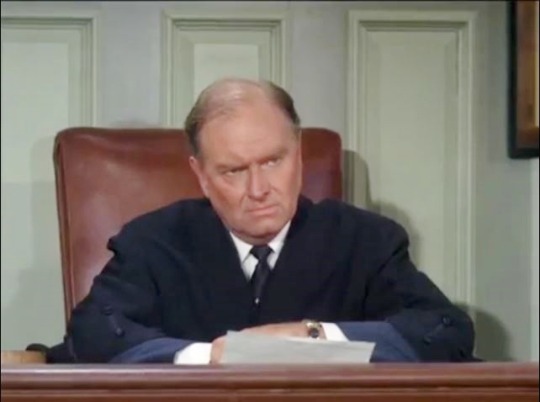
Busy character actor Parley Baer played humorless Judge Jack D. Kasten in “Lucy the Meter Maid” (1964). After Lucy attempt to re-enact the circumstance of ticketing Viv’s car, the Judge stops her mid-testimony.
JUDGE KASTEN: “Officer Carmichael, will you please explain the meaning of this travesty?”
LUCY: “With the court’s indulgence, I’m trying to establish a time element.”
Baer played MGM’s Mr. Reilly in “Ricky Needs an Agent” (1955) and the furniture salesman Mr. Perry in “Lucy Gets Chummy with the Neighbors” (1957). This is the second of his five appearances on “The Lucy Show,” including another Judge! He also made two appearances on “Here’s Lucy.” He played a Judge on “The Joey Bishop Show” (1964) and “My Living Doll” (1965), both filmed at Desilu Studios. In addtion, he played a Judge on a dozen other film and TV shows.

Harry Holcombe played a Judge in Yours, Mine and Ours (1968) starring Lucille Ball and Henry Fonda. Holcombe played Judges in 18 film and TV shows, including two episodes of “Perry Mason.” He did background work on “Here’s Lucy,” including the series finale, “Lucy Fights the System” (1974).

John McGiver played the Judge in “Lucy is Her Own Lawyer” (1964).
JUDGE: “Mrs. Carmichael. Is it absolutely necessary to have this incessant jumping back and forth? You’re making the Bench nervous.��
McGiver previously appeared on the series in “Lucy is a Kangaroo for a Day” (1962). He appeared opposite Lucille Ball as Mr. Babcock in the movie musical Mame (1974), a film that also featured a Judge (see below). He played five other Judges in films and TV shows, including Judge Thatcher in the 1973 musical Tom Sawyer.

Sid Gould played the Camden Cove Judge in “Lucy and the Soap Opera” (1966).
JUDGE: “Order in the court!”
LUCY: “Hear me out, Your Honor!”
MR. SHANNON: “Hear her out? Throw her out!”
A frequent supporting player on “The Lucy Show” and “Here’s Lucy,” Gould was Lucille Ball’s cousin by marriage to Gary Morton.
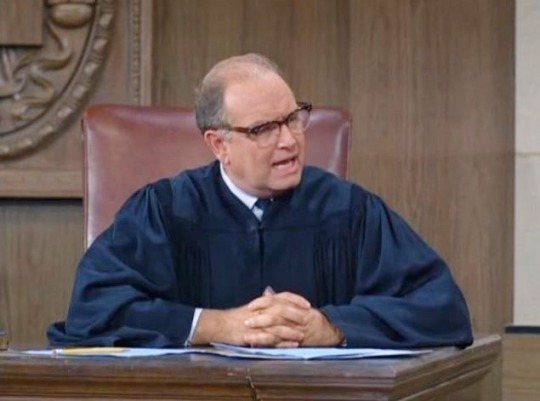
Parley Baer returned to play another Judge (this time with eyeglasses) when “Lucy Sues Mooney” in 1967.
JUDGE: “Ladies and gentlemen of the jury. Any lady who would admit to being over thirty must be telling the truth.”
MR. MOONEY: “She wouldn’t be telling the truth if she admitted to being over forty!”
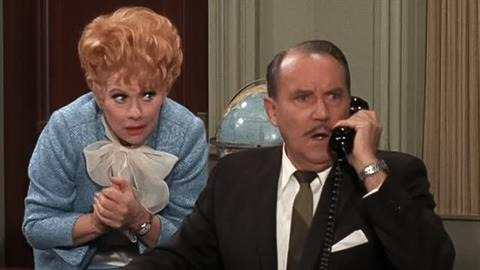
In “Lucy the Conclusion Jumper” (1968), Kim and her classmate Don are talking about keeping a household budget and visiting a city hall Judge for a school project. Lucy jumps to the conclusion they are going to get married! Lucy urges Harry to meet her at the Marriage License Office because she thinks Kim is about to elope with the supermarket box boy. When Harry hestitates, she says:
LUCY: “Well, she’s not going down there just to sing ‘Here comes the Judge! Here comes the Judge!’”

Two years later, in “Lucy and Sammy Davis Jr.” (1970), Sammy says his producer loves to sue and that his favorite words are...
“Here comes the Judge! Here comes the Judge!”
This is a catch-phrase popularized on “Rowan and Martin’s Laugh-In”, first spoken by comic Pigmeat Markham, and later by Davis. The NBC show’s second half hour aired opposite “Here’s Lucy.”
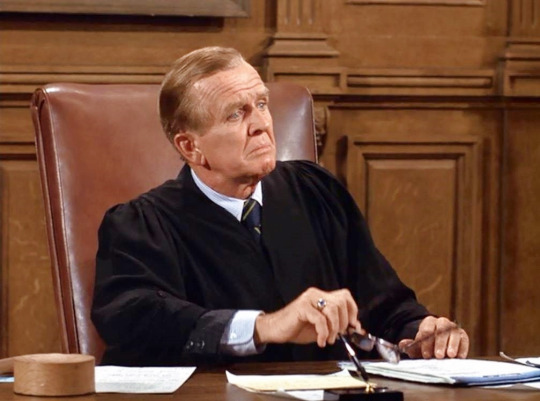
Hayden Rorke plays Judge Gibson in “Lucy and the Raffle” (1971). Coincidentally, the episode also features Gale Gordon and Sid Gould, former Lucyverse Judges. Rorke appeared on stage with Ball in Dream Girl (1947-48), a show which also featured a Judge (see above). He appeared on “I Love Lucy” as one of “The New Neighbors” (1952). Rorke was best known for his role as Dr. Bellows on “I Dream of Jeannie”.

John Wheeler played Judge Bregoff in Lucille Ball’s Mame (1974). In 1991, he played Judge Ciglio in the TV movie Runaway Father. The film also featured former Lucy Judge John McGiver (see above) as lawyer Babcock.

Lucy’s final jurist was Allan Rich as Judge Cameron Potter in “Lucy, Legal Eagle” (1986). This was the penultimate aired episode of a Lucille Ball sitcom. Rich started playing Judges on TV in 1976. In 1983, he played four TV Judges, including several appearances on “Hill Street Blues” and “Gimme A Break”. His first big screen Judge was in 1997′s Armistad. In all, Rich donned Judges robes two dozen times!
COURT ADJOURNED!

#Judge#Judges#I Love Lucy#Lucille Ball#The Lucy Show#Here's Lucy#My Favorite Husband#Life With Lucy#Allan Rich#John Wheeler#John McGiver#Moroni Olsen#Gale Gordon#Hayden Rorke#Laugh-In#Parley Baer#Sammy Davis Jr.#Sid Gould#Harry Holcombe#Ernest Sarracino#Jorge Trevino#Fay Roop#Alan Reed#George Cleveland#Edward Forbes#Desi Arnaz#Billy Gilbert#Walter Abel#Julius Tanner#Selmer Jackson
0 notes
Photo
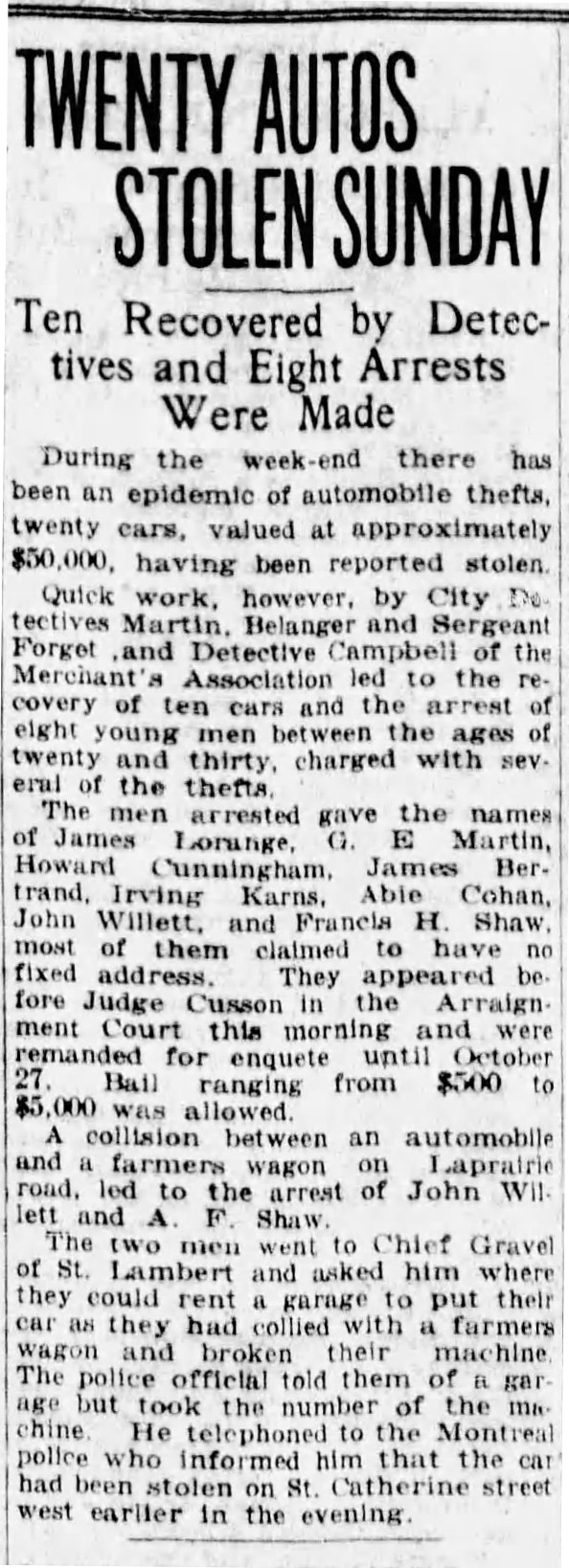
“TWENTY AUTOS STOLEN SUNDAY,” Montreal Star. October 24, 1921. Page 3.
----
Ten Recovered by Detectives and Eight Arrests Were Made
---
During the week-end there has been an epidemic of automobile thefts, twenty cars, valued at approximately $50,000 having been reported stolen.
Quick work, however, by City Detectives Martin, Belanger, and Sergeant Forget and Detective Campbell of the Merchant's Association led to the recovery of ten cars and the arrest of eight young men between the ages of twenty and thirty, charged with several of the thefts.
The men arrested gave the names of of James Lorange, G. E. Martin, Howard Cunningjam, James Bertrand, Irving Karns, Abie Cohan, John Willett and Francis H. Shaw, most of then claimed to have no fixed address. They appeared before Judge Cusson in the Arraignment Court this morning and were remanded for enquete until October 27. Bail ranging from $500 to $5,000 was allowed.
A collision between an automobile and a farmer’s wagon on Laprairie road, led to the arrest of John Willett and A. F. Shaw.
The men went to Chief Gravel of St. Lambert and asked him where they could rent a garage to put their car as as they had collided with a farmers wagon and broken their machine. The police official told them of a garage but took the number of the machine. He telephoned to the Montreal Police who informed him that the car had been stolen on St. Catherine street earlier in the evening.
#montreal#crime wave#car thieves#car theft#car thief#life of the automobile#police investigation#no fixed address#transients#remand prisoners#enquete court#out on bail#car crash#motor vehicle regulations#motor vehicle accident#history of crime and punishment in canada#crime and punishment in canada
0 notes
Photo
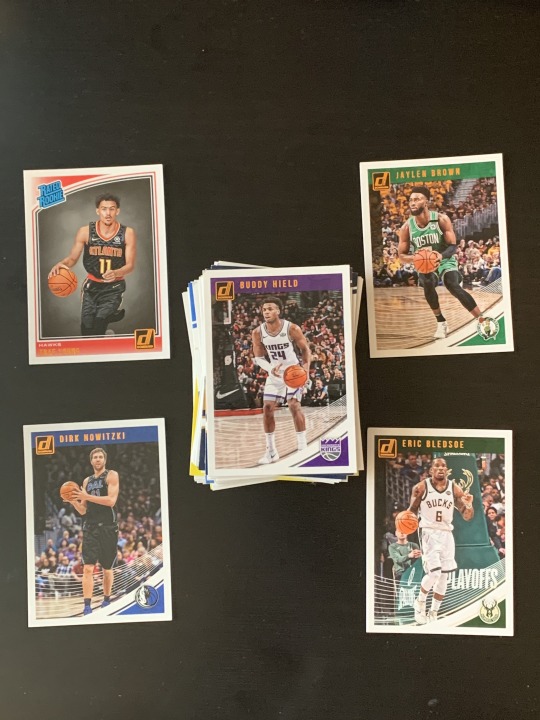
This NBA lot is stacked with some of the greatest players to play in our time! Like Kevin Durant, Kyrie Irving, Dirk Nowitzki, LaMarcus Aldridge, and Dwight Howard. If you are into the newer guys we have that to in this lot like Jaylen Brown, Trae Young, Buddy Hield, Bradley Beal, Lauri Markkanen, and so much more! So what are you waiting for? Buy NOW: https://www.mercari.com/us/item/m47403592654/
#NBA#Basketball#Sports#Kevin Durant#Trae Young#Dirk Nowitzki#bradley beal#kyrie irving#buddy hield#lauri markkanen#Dwight Howard#NBA Teams#Teams#Trending#Epic#Eric Bledsoe#LaMarcus Aldridge#Jaylen Brown#Steven Adams#Adams#Mavs#Dallas#Atlanta#Basketball Cards#Topps#Panini#Donruss#Rated Rookie#Veterans#Rookies
1 note
·
View note
Note
what are some of your favourite movies or books?
Thanks for the awesome question, hun.❤🥰❤ Since I'm a bit of a neurotic Bibliophile, l'll try to keep things short.😂
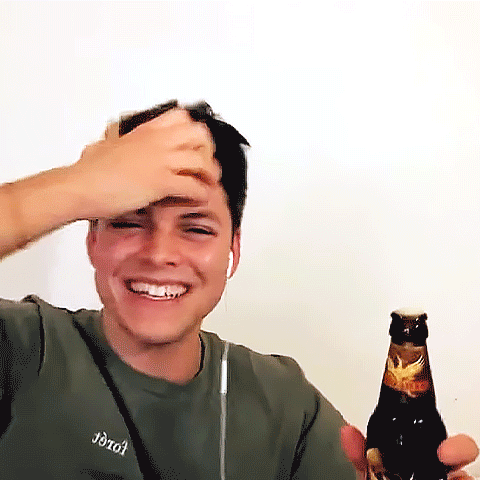
__________________________
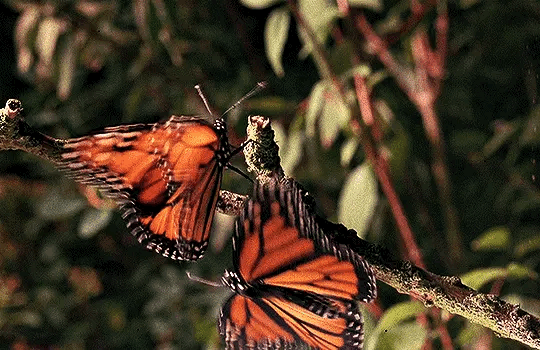
Children's Books:
Heidi - Johanna Spyri
Grimm's Complete Fairy Tales - Jacob and Wilhelm Grimm
Bezzus and Ramona - Beverly Cleary
How To Eat Fried Worms - Thomas Rockwell
Henry Higgins - Beverly Cleary
Charlotte's Web - E.B. White
Esperanza Rising - Pam Munoz
Animal Farm - George Orwell
Aesop's Fables - Aesop
The Complete Fairy Tales - Hans Christian Andersen
Dinotopia - James Gurney
The Wishful Princess - Kathie Kalafatis
The Complete Short Stories Of Mark Twain - Mark Twain
The Adventures Of Tom Sawyer - Mark Twain
Pagan Papers - Kenneth Grahame
Adventures Of Huckleberry Finn - Mark Twain
Hometown - Norman Rockwell
The Wind In The Willows - Kenneth Grahame
The Legend Of Sleep Hollow - Washington Irving
Dave Dashaway The Young Aviator - Roy Rockwood
The Outsiders - S.E. Hinton
Campfire Girls Collection - Halcyon Classics
Pippi Longstocking - Astrid Lindgren
The Children Of Green Knowe (Collection) - Lucy M. Boston
Anglo-Saxon Boy - Tony Brandman
Perrault's Fairy Tales - Charles Perrault

Adult Literature:
The Twelve Ceasars - Suetonius
The Prairie Trilogy - Willa Cather
The Complete Fiction of H.P. Lovecraft - H.P. Lovecraft
The Canterville Ghost - Oscar Wilde
SPQR: A History of Ancient Rome - Mary Beard
Major Works of Charles Dickens - Charles Dickens
True Grit - Charles Portis
King Arthur and His Knights - Howard Pyle
The Complete Sherlock Holmes - Conan Doyle
The Picture of Dorian Gray - Oscar Wilde
Ivanhoe - Walter Scott
The Iliad and the Odyssey - Homer
The Art of War - Sun Tzu
Madame Bovary - Gustav Flaubert
Angels and Insects - A.S. Byatt
My Confession - Leo Tolstoy
The Complete Bronte Collection - Bronte Sisters
Valperga- Mary Shelley
For Whom the Bell Tolls - Earnest Hemingway
Uncovering Celtic Mythology - Lucas Russo
The Way of the Wyrd: Tales of An Anglo-Saxon Sorcerer - Brian Bates
The Castle of Otrano: A Gothic Story - Horace Walpole
Lord of the Flies - William Golding
The Complete Tales of Edgar Allan Poe - E.A. Poe
The Complete works of Jane Austen- Jane Austen
The Alchemist- Paulo Coelho
The Orphan on the Rhine - Eleanor Sleath
The Strange Case of Dr. Jekyll and Mr. Hyde - Louis Stevenson
The Last Kingdom - Bernard Cornwall
Toll the Hounds - Steven Erikson
The Midnight Bell - Francis Lathom
Dracula - Bram Stoker
The Woman in Black - Susan Hill
The Divine Comedy: Inferno - Purgatorio - Paradiso - Dante Alighieri
Saxons, Vikings and Celts - Bryan Sykes
The Life and Opinions of Tristram Shandy, Gentleman - Laurence Sterne
Gone With The Wind - Margaret Mitchell
The White Horse King: The Life of Alfred Great - Benjamin R. Merkle
Moll Flanders - Daniel Defoe
The Last of The Mohicans - James Fenimore Cooper
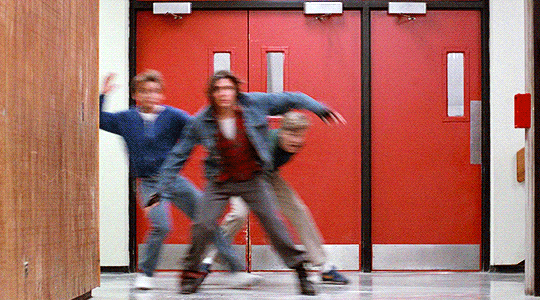
Movies/Film:
Salaam Bombay (1988)
The Assassination of Jesse James (2007)
Creepshow (1982)
The Wolf if Wallstreet (2013)
Gangs of New York (2002)
Stand by Me (1986)
The Outsiders (1983)
Shaun of the Dead (2004)
The Lost Boys (1987)
Interview with the Vampire (1994)
Scarface (1983)
Whatever Happened to Baby Jane (1962)
Bandit Queen (1995)
Gentlemen Prefer Blondes (1853)
Dances With Wolves (1990)
Gone With The Wind (1939)
The Return of the Living Dead (1985)
The Godfather (1972)
Titanic (1997)
Hellraiser (1987)
The Terminator (1984)
The Exorcist (1973)
Last of the Mohicans (1992)
Goodfellas (1990)
The Omen (1976)
Psycho (1960)
Bully (2001)
Bonus:
My Lovely Sam Soon - KDrama (2005)😂😭🤣
21 notes
·
View notes
Text
here’s my giant leftist to-read list for the next few years!!!
if a little (done!) it written next to the book, it means i’ve finished it! i’m gonna try to update this as i read but no promises on remembering haha
Economics/Politics
Property by Karl Marx
Communist Manifesto by Karl Marx (done!)
Wages, Price, and Profit by Karl Marx (done!)
Wage-Labor and Capital by Karl Marx (done!)
Capital Volume I by Karl Marx
The 1844 Manuscripts by Karl Marx
Socialism: Utopian and Scientific by Fredrich Engles
Synopsis of Capital by Fredrich Engels
The Principles of Communism by Fredrich Engles
Imperialism, The Highest Stage Of Capitalism by Vladmir Lenin
The State And Revolution by Vladmir Lenin
The Revolution Betrayed by Leon Trotsky
Fascism: What is it and How to Fight it by Leon Trotsky
In Defense Of Marxism by Leon Trotsky
The Accumulation of Capital by Rosa Luxemborg
Reform or Revolution by Rosa Luxemburg
Discipline and Punish by Michel Foucault
The Conquest of Bread by Peter Kropotkin
On Anarchism by Noam Chomsky
Profit over People by Noam Chomsky
An Introduction to Marxist Economic Theory by Ernest Mandel
The Affluent Society by John Kenneth Galbraith
The Postmodern Condition by Jean François Lyotard
Capitalist Realism by Mark Fisher
The Socialist Reconstruction of Society by Daniel De Leon
Anarchism and Other Essays by Emma Goldman
Socialism Made Easy by James Connolly
Race
Biased: Uncover in the Hidden Prejudice That Shapes What We See, Think, and Do
Blindspot by Mahzarin R. Banaji
Racism Without Racists: Color-blind Racism And The Persistence Of Racial Inequality In America by Eduardo Bonilla-Silva
How To Be Less Stupid About Race: On Racism, White Supremacy And The Racial Divide by Crystal M. Flemming
This Book is Anti-Racist: 20 Lessons on How To Wake Up, Take Action, And Do The Work by Tiffany Jewell & Aurelia Durand
The Next American Revolution: Sustainable Activism For The Twenty-First Century by Grace Lee Boggs
Tell Me Who You Are by Winona Guo & Priya Vulchi
The Fire This Time: A New Generation Speaks About Race by Jesymn Ward
Class, Race, and Marxism by David R. Roediger
America for Americans: A History Of Xenophobia In The United States by Erica Lee
The Politics Of The Veil by Joan Wallach Scott
A Different Mirror A History Of Multicultural America by Ronald Takaki
A People’s History Of The United States by Howard Zinn
Black Theory
The Wretched Of The World by Frantz Fanon
Black Marxism by Cedric J Robinson
Malcolm X Speaks by Malcolm X
Women, Culture, and Politics by Angela Davis
Women, Race, & Class by Angela Davis (done!)
Freedom is a Constant Struggle by Angela Davis (done!)
The Meaning of Freedom by Angela Davis
Sister Outsider by Audre Lorde
Ain’t I A Woman? by Bell Hooks
Yearning by Bell Hooks
Dora Santana’s Works
An End To The Neglect Of The Problems Of The Negro Women by Claudia Jones
I Am Your Sister by Audre Lorde
Women’s Liberation And The African Freedom Struggle by Thomas Sankara
W.E.B. DuBois Essay Collection
Black Reconstruction by W.E.B. DuBois
Lynch Law by Ida B. Wells
The Bluest Eye by Toni Morrison
Sula by Toni Morrison
Song Of Solomon by Toni Morrison
Beloved by Toni Morrison
Paradise by Toni Morrison
A Mercy by Toni Morrison
This Bridge Called My Back by Cherríe Moraga
Stamped from the Beginning: The Definitive History of Racist Ideas in America
So You Want to Talk About Race by Ijeoma Oluo
The New Jim Crow: Mass Incarceration in the Age of Colorblindness by Michelle Alexander
Black Feminist Thought by Patricia Hill Collins
Eloquent Rage: A Black Feminist Discovers Her Superpower by Dr. Brittney Cooper
I Know Why the Caged Bird Sings by Maya Angelou
Black Skins, White Masks and The Wretched of the Earth by Frantz Fanon
Killing of the Black Body
Revolutionary Suicide by Huey P Newton
Settlers; The myth of the White Proletariat
Fearing The Black Body; The Racial Origins of Fatphobia
Freedom Dreams; The Black Radical Imagination
How Capitalism Underdeveloped Black America
How Europe Underdeveloped Africa
An Argument For Black Women’s Liberation As a Revolutionary Force by Mary Anne Weathers
Voices of Feminism Oral History Project by Frances Beal
Ghosts In The Schoolyard: Racism And School Closings On Chicago’s South Side by Eve L. Ewing
Tears We Cannot Stop: A Sermon To White America by Michael Eric Dyson
Why We Can’t Wait by Martin Luther King, Jr.
Fatal Invention: How Science, Politics, Big Business, Re-create Race In The 21st Century by Dorothy Roberts
We Gon’ Be Alright: Notes on Race & Resegregation by Jeff Chang
They Can’t Kill Us All: Ferguson, Baltimore, and a New Era In America’s Racial Justice Movement by Wesley Lowery
The Common Wind by Julius S. Scott
Black Is The Body: Stories From My Grandmother’s Time, My Mother’s Time, And Mine by Emily Bernard
We Were Eight Years In Power: An American Tragedy by Ta-Nehisi Coates
American Lynching by Ashraf H. A. Rushdy
Raising Our Hands by Jenna Arnold
Redefining Realness by Janet Mock
When Affirmative Action Was White: An Untold History of Racial Inequality in Twentieth-Century America by Ira Katznelson
Whistling Vivaldi: How Stereotypes Affects Us and What We Can Do
Citizen: An American Lyric by Claudia Rankine
Left of Karl Marx: The Political Life Of Black Communist Claudia Jones by Carole Boyce Davies
Black Studies Manifesto by Darlene Clark
The Hate U Give by Angie Thomas
The Souls Of Black Folk by W.E.B. Du Bois
Darkwater by W.E.B. Du Bois
The Education Of Blacks In The South, 1860-1935 by James D. Anderson
The Half Has Never Been Told: Slavery And The Making Of American Capitalism by Edward E. Baptist
The Color Of Money: Black Banks And The Racial Wealth Gap by Mehrsa Baradaran
A Black Women’s History Of The United States by Daina Ramey Berry & Kali Nicole Gross
The Price For Their Pound Of Flesh: The Value Of The Enslaved, From Womb to Grave, In The Building Of A Nation by Daina Ramey Berry
North Of Slavery: The Negro In The Free States, 1780-1869 by Leon F. Litwack
Black Stats: African Americans By The Numbers In The Twenty-First Century by Monique M. Morris
Pushout: The Criminalization of Black Girls in Schools by Monique M. Morris
40 Million Dollar Slaves: The Rise, Fall, And Redemption of The Black Athlete by William C. Rhoden
From #BlackLivesMatter To Black Liberation by Keeanga-Yamahtta Taylor
A More Beautiful And Terrible History: The Uses And Misuses Of Civil Rights History by Jeanne Theoharis
Medical Apartheid: The Dark History Of Medical Experimentation On Black Americans From Colonial Times To The Present by Harriet A. Washington
Working At The Intersections: A Black Feminist Disability Framework” by Moya Bailey
Theory by Dionne Brand
Black Women, Writing, And Identity by Carole Boyce Davies
Slavery By Another Name: The Re-enslavement Of Black Americans From The Civil War To World War II by Douglass A. Blackmon
Black Like Me by John Howard Griffin
The Fire Next Time by James Baldwin
Some Of Us Are Very Hungry Now by Andre Perry
The Origins Of The Urban Crisis: Race and Inequality In Postwar Detroit by Thomas Surgue
They Can’t Kill Us Until They Kill Us by Hanif Abdurraqib
Beyond Containment: Autobiographical Reflections, Essays and Poems by Claudia Jones
The Black Woman: An Anthology by Toni McCade
Double Jeopardy: To Be Black and Female by Frances Beal
How We Get Free: Black Feminism and the Combahee River Collective by Keeanga-Yamahtta Taylor
Indigenous Theory
Colonize This! by Daisy Hernandez and Bushra Rehman
As We Have Always Done
Braiding Sweetgrass
Spaces Between Us
The Sacred Hoop by Paula Gunn Allen
Native: Identity, Belonging, And Rediscovering God by Kaitlin Curtice
An Indigenous People’s History Of The United States by Roxanne Dunbar-Ortiz
Why Indigenous Literatures Matter by Daniel Heath Justice
Highway of Tears: A True Story of Racism, Indifference, And The Pursuit Of Justice For Missing And Murdered Indigenous Women and Girls by Jessica McDiarmid
The Other Slavery by Andrés Reséndez
Seven Fallen Feathers by Tanya Talaga
All Our Relations: Indigenous Trauma In The Shadow Of Colonialism by Tanya Talaga
All Our Relations: Finding The Path Forward by Tanya Talaga
Everything You Wanted To Know About Indians But Were Afraid To Ask by Anton Treuer
Rez Life: An Indian’s Journey Through Reservation Life by David Treuer
Latine Theory
Borderlands/La Frontera by Gloria Anzaldúa
Open Veins of Latin America: Five Centuries of Pillage of A Continent by Eduardo Galeano
Inventing Latinos: A New Story of American Racism by Laura E. Gomez
De Colores Means All Of Us by Elizabeth Martinez
Middle Eastern And Muslim Theory
How Does It Feel To Be A Problem? Being Young And Arab In America by Moustafa Bayoumi
We Too Sing America: South Asian, Arab, Muslim, and Sikh Immigrants Shape Our Multiracial Future by Deepa Iyer
Alligator and Other Stories by Dima Alzayat
API Theory
Orientalism by Edward Said
The Making Of Asian America by Erika Lee
On Gold Mountain by Lisa See
Strangers From A Different Shore: A History of Asian Americans by Ronald Takaki
They Called Us Enemy (Graphic Novel) by George Takei
Yellow Peril!: An Archive of Anti-Asian Fear by Edited by John Kuo Wei Tchen and Dylan Yeats
Yellow: Race In America Beyond Black And White by Frank H. Wu
Alien Nation: Chinese Migration In The Americas From The Coolie Era Through World War II by Elliott Young
The Good Immigrants: How The Yellow Peril Became The Model Minorities by Madeline H. Ysu
Asian American Dreams: The Emergence Of An American People by Helen Zia
The Myth Of The Model Minority: Asian Americans Facing Racism by Rosalind S. Chou & Joe R. Feagin
Two Faces Of Exclusion: The Untold Story Of Anti-Asian Racism In The United States by Lon Kurashige
Whiteness
White Fragility by Robin Di Angelo (done!)
White Kids: Growing Up With Privilege In A Racially Divided America by Margaret A. Hagerman
Waking Up White by Deby Irving
The History of White People by Nell Irvin Painter
White Like Me: Reflections On Race From A Privileged Son by Tim Wise
White Rage by Carol Anderson
What Does It Mean To Be White: Developing White Racial Literacy by Robin DiAngelo
The Invention of The White Race: Volume 1: Racial Oppression and Social Control by Theodore W. Allen
The Invention of The White Race: Volume 2: The Origin of Racial Oppression in Anglo-America by Theodore W. Allen
Immigration
Call Me American by Abdi Nor Iftir
Create Dangerously: The Immigrant Artist At Work by Edwidge Danticat
My Family Divided by Diane Guerrero
The Devil’s Highway: A True Story by Luis Alberto Urrea
The Undocumented Americans by Karla Cornejo Villavicencio
Enrique’s Journey by Sonia Nazario
Tell Me How It Ends: An Essay In Forty Questions by Valeria Luiselli
Voter Suppression
One Person, No Vote: How Voter Suppression Is Destroying Our Democracy by Carol Anderson
Give Us The Vote: The Modern Struggle For Voting Rights In America by Ari Berman
Prison Abolition And Police Violence
Abolition Democracy by Angela Davis
Are Prisons Obsolete? by Angela Davis
The Prison Industrial Complex by Angela Davis
Political Prisoners, Prisons, And Black Liberation by Angela Davis
Just Mercy by Bryan Stevenson (done!)
The End Of Policing by Alex S Vitale
Invisible No More: Police Violence Against Black Women and Women of Color by Andrea J. Ritchie
Choke Hold: Policing Black Men by Paul Butler
From The War On Poverty To The War On Crime: The Making Of Mass Incarceration In America by Elizabeth Hinton
Feminist Theory
The Second Sex by Simone de Beauvoir
A Vindication of the Rights of Women by Mary Wollstonecraft
Bad Feminist by Roxanne Gay
7 Feminist And Gender Theories
Race, Gender, And Class by Margaret L. Anderson
African Gender Studies by Oyèrónkẹ́ Oyěwùmí
The Invention Of Women by Oyèrónkẹ́ Oyěwùmí
What Gender Is Motherhood? by Oyèrónkẹ́ Oyěwùmí
Feminism Without Borders: Decolonizing Theory, Practicing Solidarity by Chandra Talpade Mohanty
I Am Malala by Malala Youssef
LGBT Theory
Gender Trouble by Judith Butler
Performative Acts and Gender Constitution by Judith Butler
Imitation and Gender Insubordination by Judith Butler
Bodies That Matter by Judith Butler
Excitable Speech by Judith Butler
Undoing Gender by Judith Butler
The Roots Of Lesbian And Gay Opression: A Marxist View by Bob McCubbin
Compulsory Heterosexuality And Lesbian Existence by Adrienne Rich
Decolonizing Trans/Gender 101 by B. Binohan
Gay.Inc: The Nonprofitization of Queer Politics by Merl Beam
Pronouns Good or Bad: Attitudes and Relationships with Gendered Pronouns
Transgender Warriors
Whipping Girl; A Transsexual Woman on Sexism and the Scapegoating of Femininity
Stone Butch Blues by Lesie Feinberg (done!)
The Stonewall Reader by Edmund White
Sissy by Jacob Tobia
Gender Outlaw by Kate Bornstein
Butch Queens Up In Pumps by Marlon M. Bailey
Black On Both Sides: A Racial History Of Trans Identities by C Riley Snorton
Go Tell It On The Mountain by James Baldwin
Ezili’s Mirrors: Imagining Black Queer Genders by Omise’eke Natasha Tinsley
Lavender and Red by Emily K. Hobson
147 notes
·
View notes
Text
Two With Roscoe Arbuckle
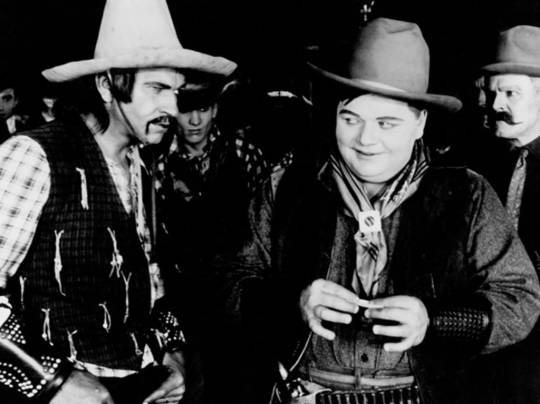
Wallace Beery and Roscoe "Fatty" Arbuckle in The Round-Up (George Melford, 1920)
Cast: Roscoe "Fatty" Arbuckle, Mabel Julienne Scott, Irving Cummings, Tom Forman, Jean Acker, A. Edward Sutherland, Wallace Beery. Screenplay: Edmund Day, Tom Forman. Cinematography: Paul P. Perry.
"Nobody loves a fat man" said the poster for Arbuckle's 1920 feature, which was meant to be wistfully ironic, since at the time, everybody loved "Fatty" Arbuckle (a nickname he hated). The irony went from wistful to bitter in a couple of years, when the scandal surrounding the death of Virginia Rappe turned Arbuckle into one of the country's most despised men, bringing his career to a halt. But when The Round-Up was made, Arbuckle was so popular that he received the featured billing for a film in which he was a supporting player, the comic relief in a somewhat routine Western. Arbuckle plays the sheriff in a small Arizona town, where he's much admired because he uses his dexterity, rather than his fists or guns, to disarm the bad guys. But he's painfully shy around women, which is why he loses the girl he loves (Jean Acker) to someone else. The main story revolves around a prospector (Irving Cummings) who is thought to be dead, so his girlfriend (Mabel Julienne Scott) marries someone else. Meanwhile, a lot of trouble gets stirred up by the "half-breed" Buck McKee (Wallace Beery). Things get sorted out eventually after a lot of chases and gunfights. Arbuckle and Beery are the best things in the movie, along with some location scenery handsomely photographed by Paul P. Perry.
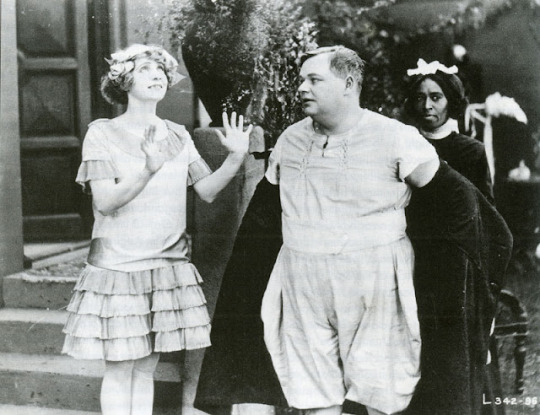
The Life of the Party (Joseph Henabery, 1920)
Cast: Roscoe "Fatty" Arbuckle, Winifred Greenwood, Roscoe Karns, Julia Faye, Viora Daniel, Frank Campeau. Screenplay: Irvin S. Cobb, Walter Woods. Cinematography: Karl Brown.
As a knockabout comedy more in the Arbuckle mainstream, The Life of the Party seems designed largely to provide him with an opportunity to dress up in children's party clothes. The plot has to do with a women's group who are out to bust up a trust that fixes the price of milk. Arbuckle plays Algernon Leary, an unscrupulous lawyer who is at first willing to go along with the trust, but is converted to their side by a pretty young member of the group (Viora Daniel). She also happens to be engaged to a judge (Frank Campeau) who, unknown to her, is in the pockets of the milk trust. This leads to much farcical running around, especially after the women's group decides to throw a fundraising party to which everyone is expected to come dressed as babies. It all goes on too long. The cast includes Roscoe Karns, an actor who didn't really come into his own until sound arrived, giving him the chance to reel off snappy patter for Howard Hawks in Twentieth Century (1934) and His Girl Friday (1940).
#The Round-Up#The Life of the Party#George Melford#Joseph Henabery#Roscoe “Fatty” Arbuckle#Wallace Beery
1 note
·
View note
Photo
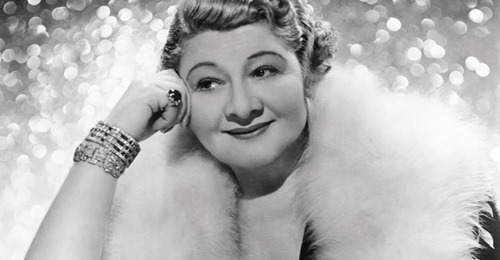
Last of the Red Hot Mamas
The Queen of Jazz
Sophie Tucker was a singer and comedienne whose powerful voice and brassy wit delighted audiences for over six decades.
Sophie’s Jewish parents had to escape from Russia in 1886 after her father had deserted the Russian military, and she was born on the boat to America. The family settled in Hartford, Connecticut where they ran a kosher boarding house and restaurant. Sophie and her three siblings worked hard in the family business, waking up at 3 am every day to peel and chop vegetables before school. After Sophie got home she waited tables and washed dishes.
From almost the moment of birth, Sophie had a huge and magnetic personality. She was confident, sassy, and uninhibited. Jewish vaudeville stars often stayed at her family’s boarding house and she was fascinated by them and their lives. She always knew she was destined for a life in show business. Her parents absolutely forbade her to join the paskudnyaks (rascals) who stayed at their rooming house. Sophie still found a way to perform – she started singing for their guests as she served them. “I would stand up in the narrow space by the door and sing with all the drama I could put into it. At the end of the last chorus, between me and the onions there wasn’t a dry eye in the place.”
Desperate to leave home, she eloped in 1903 with local beer truck driver Louis Tuck. When they returned, her parents organized a traditional Orthodox wedding for them. They had a son, Burt, in 1906, and lived with her family, where she was back to her old role of cooking, cleaning, and serving customers. Meanwhile a frequent guest was Willie Howard, a popular vaudeville comedian and the first to use openly Jewish content in his act. He was impressed by Sophie’s natural talent as an entertainer, and he urged her to move to New York and break into show business. Sophie’s husband Louis did not share her enthusiasm for the stage and after she told him she wanted to move to New York, he took off. Soon, Sophie left Burt with her family, telling them she was going to New Haven for a short vacation. Instead, she moved to New York and never returned. She was 19 years old. Burt was raised by Sophie’s family, and Sophie kept in frequent contact with them over the years.
Sophie arrived in New York with a letter of introduction to a famous composer from Willie Howard, but the composer wasn’t impressed by her singing. She was quickly able to find work singing at coffeehouses and saloons. At the German Village, a popular beer garden, she sang 50-100 songs a night for $15 a week. She was such a hit that she was soon making over $150 a week in pay and tips.
Sophie was generous with her money. She sent most of what she made to her family, and lived in a shabby boarding house where the other residents were prostitutes. A nice Jewish girl from Hartford, Sophie had never encountered this type of woman before, but she wasted no time making friends with her neighbors, and started a longtime practice of giving free women-only concerts in bordellos. Sophie shared her money and belongings with the call girls, and hid the money they made from their pimps. She later said, “Every one of them supported a family back home, or a child somewhere.”
At the time, $150/week was an impressive salary for a single woman, but it wasn’t enough for Sophie, who wanted to get out of the restaurant business once and for all and make it big in vaudeville. She got her first break in 1907: a chance to audition for impresario Chris Brown’s Amateur Night. After her audition she overheard Brown say, “This one’s so big and ugly, the crowd out front will razz her. Better get some cork and black her up.” He told Sophie that she passed the audition and would be featured in the show. However, she had to do it in blackface. Sophie was aghast at the suggestion, but Brown and the other producers insisted that her only chance for a career in show business was in blackface. She agreed to do it.
Sophie’s first vaudeville gig was at Tony Pastor’s on the Bowery where she was booked for a pre-show before the matinee. When she took the stage, the theater was empty. She started singing, but as people entered the room they completely ignored her, chatting noisily as they awaited the main event. She suddenly stopped the show, and started berating the audience for being so rude to her. Sophie had what Jews call chutzpah – audacious self-confidence – and she displayed so much humor and spirit that the audience fell in love with her. Nobody made a peep for the rest of the show, and they demanded three encores.
She was booked onto the New England Vaudeville circuit to sing African-American spirituals, and got rave reviews everywhere she went. It wasn’t just her big voice audiences loved, it was also her big personality, her confident swagger combined with self-deprecating humor. Sophie had a sharp wit and a voice that didn’t need a microphone to fill a room.
Audiences adored Sophie’s minstrel act, but she hated performing in blackface. Finally, at a performance in Boston, she’d had enough. She told the producer that her blackface makeup and costume were lost in transit, and before he could argue she marched onstage as herself. She told the shocked audience, “You-all can see I’m a white girl. Well, I’ll tell you something more: I’m not Southern. I’m a Jewish girl and I just learned this Southern accent doing a blackface act. And now, Mr. Leader, please play my song.” She never performed in blackface again.
Some of Sophie’s songs were bawdy, filled with innuendo and double entendre, while others were sentimental. Her most popular songs included “Some of These Days” and the Jewish favorite, “My Yiddishe Mama.” Initially Sophie only performed “Yiddishe Mama” in front of mostly Jewish audiences since much of the song was in Yiddish, but she soon found that all audiences loved the song. Even if they didn’t understand all of the words, they could appreciate her heartful singing about her devoted mother.
Sophie did a European tour in the 1920’s which was a huge success. When she arrived in England in 1922, she was greeted by fans with a huge sign reading “Welcome Sophie Tucker, America’s Foremost Jewish Actress!” Looking back at her career later in life, she described that sign as her proudest moment. Sophie performed for King George V and Queen Mary at the London Palladium in 1926. She greeted the monarch with a hearty “Hiya King!” The Daily Express described Sophie as “a big fat blond genius, with a dynamic personality and amazing vitality.” Yiddishe Mama became an international hit, and she was asked to perform the song in Berlin by the Berlin Broadcasting Company in 1931. Two years later, when Hitler came to power in 1933, all copies of the recording were destroyed.
Comedy writer Bruce Vilanch saw Sophie Tucker perform when he was a child. He remembered, “She’d make you laugh like crazy. She would belt. She still could blow the roof off the joint. Then she would do something incredibly schmaltzy, she would turn on a dime and make the audience weep… As soon as you were done crying, she would turn around and do some bawdy song… Everything she said was with the force of a judge making a sentence. She didn’t speak, she made policy statements.”
Throughout her career, Sophie chose songs mostly written by black and Jewish songwriters from Tin Pan Alley, including young Irving Berlin. She was close friends with her fellow Vaudeville performer Bill Robinson, known as Bojangles. When Sophie invited Bill to her sister’s wedding in the 1920’s, the doorman wouldn’t let him in, telling him to go through the kitchen. Sophie heard this and immediately pushed the doorman out of the way, closed the front door, and told the guests, “OK everybody goes through the kitchen.”
Despite her act’s raciness, she said “I’ve never sung a single song in my whole life on purpose to shock anyone. My ‘hot numbers’ are all, if you will notice, written about something that is real in the lives of millions of people.” Her songs included, “I May Be Getting Older Every Day (But Younger Every Night),” “I’m The Last of the Red-Hot Mamas,” “I Ain’t Takin’ Orders From No One,” and “When They Start to Ration my Passion, It’s Gonna Be Tough on Me.” She often made fun of her size, calling herself a “perfect 48.”
She kept improving her act, and after a decade as a solo performer, she created a back-up band of black jazz musicians called the “Kings of Syncopation.” They recorded several albums together, all of which were hits, and toured the country playing to enthusiastic crowds. In Chicago they played 15 weeks at the Palace and then at every other theater in town. Crooner Tony Bennett called Sophie “the most underrated jazz singer that ever lived.”
After a few years as the self-styled “Queen of Jazz,” Sophie re-imagined herself again, as a cabaret performer, accompanied by piano player Ted Shapiro. He became part of her act as they developed a snappy banter. Over the years she did some film, radio and TV work but what she loved most was interacting with a live audience.
Sophie married two more times, but neither husband liked being “Mr. Sophie Tucker” and both marriages failed. She said, “Once you start carrying your own suitcase, paying your own bills, running your own show, you’ve done something to yourself that makes you one of those women men like to call ‘a pal’ and “a good sport,’ the kind of woman they tell their troubles to. But you’ve cut yourself off from the orchids and the diamond bracelets, except those you buy yourself.” Throughout her life, Sophie was known for her generosity, and she gave away much of what she made to a variety of philanthropic causes. She established the Sophie Tucker Foundation in the early 1950’s, and endowed hospitals, synagogues, actors guilds, and several charitable organizations in Israel.
Sophie continued performing until the end of her life, even after getting lung cancer. While undergoing treatment she was still doing two shows a night. Sophie died at age 80 in 1966, during a months-long theater engagement. As she lay on her death bed, she asked the nurse to “bring me my chiffon hanky, bring me my wig” and she did bits from her act until she took her last breath. Thousands of mourners attended her funeral at Emanuel Synagogue Cemetery in Wethersfield, Connecticut. Known as the “Last of the Red-Hot Mamas,” Sophie’s act inspired later female performers such as Mae West and Bette Midler.
For entertaining audiences around the world for sixty years and giving generously to others, we honor Sophie Tucker as this week’s Thursday Hero.
Accidental Talmudist
29 notes
·
View notes
Note
💗 i would like a list of all 3 million potential pairings please 🙈
my god, i would love to take the time out of my day to give that to you, and just know that we can ship literally anybody and everybody because that’s all we ever do in the first place and you know how much i love doing that with you too. my favorite writing partner everybody, bre is hands down the best partner in the whole world, and i’m lucky enough to be able to have her at all. she’s mine and i’m never going to let her go because i love her so much! she’s literally the best thing to ever happen to me and i know i wouldn’t be here through the shitty times and all without her! everybody better go follow her right now and send her all the love i swear to god, because she’s the only person on this hell site that shows me the attention that i deserve! also that list of potential pairings is below the cut, and don’t say i didn’t warn you. 👀
send 💗 if you’re open to the possibility of a romantic ship eventually happening between our muses
all these characters are up for shipping with all your characters:
alex gardiner (paul rudd)
alexander hamilton (lin-manuel miranda)
alex mullner (brant daughterty)
alice liddell (madelyn cline)
alisha khara (jameela jamil)
annie abel (luna blaise/anya chalotra)
antonia moreno (victoria justice)
apollonia levine (anastasia karanikolaou)
arthur pendragon (niall horan)
ashley spinelli (ursula corbero)
aspen rhodes (sofia black-d'elia)
astrid porter (karlie kloss)
audrey ramirez (selena gomez)
august khalil (rami malek)
axel turner (charlie weber/skeet ulrich)
aziz hassan (riz ahmed)
bailee rose (jenny boyd)
bambi prince (lachlan watson)
barbie roberts (kate upton)
barley lightfoot (michael clifford)
beatriz velasco (camila cabello/diane guerrero)
beau hester (froy gutierrez)
beck collins (joe keery)
bellatrix lestrange (carmela zumbado)
belle dubois (margaret qualley)
belle summers (candice king)
berliouz bonfamille (alex fitzalan)
bernard davenport (gavin leatherwood)
billie groves (kiana lede/emmy raver-lampman)
billy hargrove (dacre montgomery)
bindi culver (meg donnelly/rachel mcadams)
bo-peep ‘bo’ patterson (amanda seyfried)
brady gardiner (nathaniel buzolic)
brielle stewart (alexandra daddario)
bronwyn pierson (madelaine petsch)
buzz lightyear (paul mescal/chris pine)
calliope jung (phillipa soo)
camille aguilar (jeanine mason)
carl fredricksen (tye sheridan)
celeste quintana (rosalia/maite perroni)
chandler armstrong (iwan rheon)
cinderella tremaine (lily james)
clementine ahn (jamie chung)
cliff egan (stephen amell)
colleen lowell (jodie comer)
connor catrell (thomas doherty)
copper slade (nick jonas)
cordelia goodwin (ryan destiny/candice patton)
coriander thompson (dacre montgomery/chris evans)
cornelius robinson (simon baker)
cruella de vil (melanie martinez)
cyrus quinney (owen joyner)
daisy vaughn (isabella gomez/aimee carrero)
dakota atkins (amber midthunder)
dale monks (keiynan lonsdale)
dalton davis (harris dickinson)
daniela ‘dani’ costello (becky g/eva longoria)
dash parr (jaden smith)
delilah diaz (camila cabello/diane guerrero)
delphine washington (antonia thomas)
delta montgomery (manu gavassi)
denver koch (thomas elms)
devon montgomery (iain de caestecker)
diego hargreeves (david castaneda)
dorcas meadowes (ariela barer)
dory blau (julia louise-dreyfus)
duke blaise (ashley graham & matthew daddario — reincarnated)
duncan traeger (zac efron)
edmund whittaker (richard madden)
edwin orwell (nicholas galitzine)
elena flores (jenna ortega)
eleonora moretti (benedetta gargari)
eleven (millie bobby brown)
elio montgomery (noah schnapp/brendon urie)
elisabeth ‘elsa’ andersson (candice king)
elliott murdoch (kj apa)
eloise thompson (taylor hill/zoey deutch)
elwood leith (sam claflin)
emerson wheaton (beau mirchoff)
emily sondheim (eve fraser)
emmy silverstein (nat wolff/michiel huisman)
ericka ‘ricki’ santos (danna paola)
esmeralda guybertaut (priyanka chopra)
everest sorenson (adam driver)
ezekiel ‘zeke’ bauer (neels visser)
fa mulan (awkwafina)
felix dawson (lukas gage)
ferris rockwell (joshua bassett)
five hargreeves (aidan gallagher/rob raco/john mulaney)
florence prata (barbie ferreira)
flynn rider (jacob elordi/steven r mcqueen)
frank castle (jon bernthal)
gabrielle dupres (louriza tronco)
genevieve rizzo (troian bellisario)
gill moorish (harrison ford)
godwin vivar (diego boneta)
grainger anslow (justin hartley)
grant wesley (keanu reeves)
griffin price (liam hemsworth)
guinevere ‘gwen’ flores (ester exposito/ana de armas)
gulliver kennedy (robert sheehan)
gunner mccoy (miles heizer)
halston krogen (nick robinson)
hamish duke (thomas elms)
harper graves (sydney sweeney)
harry potter (alberto rosende)
harvey wolff (joaquin phoenix)
hawke bradbury (brenton thwaites)
helen parr (megan thee stallion/kerry washington)
hendrix palmer (mark fischbach)
henley howell (dylan everett/paul wesley)
henrik nilsen (herman tommeraas/chris evans)
hercules sabri (aubrey joseph)
hermione granger (quintessa swindell)
holden krogen (jack falahee)
holly la stella (olivia holt)
honey lemon (irene ferreiro)
hudson reid (jaeden lieberher/paul mescal/james mcavoy)
irving reid (matty healy)
isobel evans (lily cowles)
jacoba ‘cobi’ abernathy (geraldine viswanathan)
jake bennett (joe jonas)
jake breckenridge (landon liboiron)
james potter (noah centineo)
james ‘sully’ sullivan (hozier)
jane porter (zoe sugg)
jasmine agrabah (naomi scott)
jessica jones (krysten ritter)
jim hopper (david harbour)
johanna ‘jo’ gardiner (carlson young)
josefine olive (lili reinhart/maika monroe)
joseph ‘joey’ carnegie (chris o'dowd)
juliette russo (camila mendes)
juno nicks (gideon adlon/linda cardellini)
justin miller (michael b. jordan)
keaton green (charlie plummer/austin butler/alexander skarsgard)
keifer fry (nathan parsons)
kennedy sutherland (florence pugh)
khalid farid (mena massoud)
kiernan jost (jack barakat)
kiki penn (natalie alyn lind)
kim possible (karen gillan)
kit dempsey (aaron taylor-johnson/michael sheen)
kristoff bjorgman (ben hardy)
kuzco inca (tommy martinez)
lady alvarez (camila cabello/diane guerrero)
lake montgomery (jace norman/casey deidrick/jeff goldblum)
lazarus (sean teale/tom ellis)
lennox wells (billie piper)
leonardo ‘leo’ light (armie hammer)
levi wesley (gerard butler)
liam wheaton (lucas lynngaard tonnesen/dominic sherwood)
lilac montgomery (sophia lillis/deborah ann woll)
lila pitts (ritu arya)
lilo pelekai (courtney eaton)
lola carver (carla gugino)
macy merritt (kylie jenner)
madeline hawkins (rowan blanchard/kaylee bryant)
madison bloomfield (gwyneth paltrow)
maggie wheaton (virginia gardner)
maria deluca (heather hemmens)
mariana de la cruz (victoria justice/salma hayek)
marianne darden (elizabeth olsen)
marisol torres (alexa demie/salma hayek)
marlene phan (brianne tju)
matilda franks (brooke markham)
matthew murdock (charlie cox)
max tian (chloe bennet)
mckenzie whitman (danielle rose russell)
megara creon (ashley moore)
melanie carter (brenna d'amico/zooey deschanel)
melody burns-newman (camren bicondova)
mercutio bellini (giancarlo commare)
merida dunbroch (bree kish)
michael ‘goob’ yagoobian (dylan o’brien/andrew scott)
mickey hader (shawn mendes)
miguel rivera (diego tinoco)
mike wheeler (finn wolfhard)
mildred ‘millie’ brantwood (stella maeve)
milo martinez (itzan escamilla/tyler posey)
milo thatch (jason ralph)
minerva ‘minnie’ winslett (jenna coleman)
mischa locklear (jenny slate)
moana motunui (auli'i cravalho)
molly wheaton (saoirse monica jackson/kristen bell/kristin chenoweth)
monet bugg (annie murphy)
mordecai ‘cai’ baird (joseph morgan)
murray bauman (brett gelman)
nadja (natasia demetriou)
naomi phillips (hunter king)
natalie fuller (krysten ritter)
nate gardiner (tom holland/thomas hayes/joe keery/adam scott)
nemo fisher (nick robinson)
nick novak (jon bernthal)
nick wilde (jake johnson)
nina baxter (laura harrier)
nolan van ness (louis hynes/benjamin wadsworth)
nymphadora tonks (kennedy walsh)
odessa barnes (inanna sarkis)
osbourne russo (oliver jackson-cohen)
otis richardson (finn jones)
owen monroe (zachary levi)
paloma katz (brittany o'grady)
paxton gardiner (douglas booth)
pearl turner (maia mitchell/aubrey plaza)
penny proud (sarah jeffery)
perdita ryan (alisha boe/zoe kravitz)
perrie wheaton (ariela barer/jessica alba)
peter pan (rudy pankow)
peter pettigrew (alex lawther)
phil mcdermot (leo howard/dylan o’brien)
phineas flynn-fletcher (michael provost)
piper donahue (millie bobby brown/katherine langford/felicity jones)
pippa mei (amy okuda)
pollux isola (camila mendes)
portia sadler (hayden panettiere)
prairie gallagher (lucy boynton)
quaid ‘q’ wright (jake gylenhaal)
quinton saunders (jamie dornan)
rain montgomery (nick jonas)
ramona montgomery-wallis (lana condor/ashley park)
reed knightley (arthur darvill)
reign fentworth (madison bailey/vanessa morgan)
reno thames (joshua bassett)
richie tozier (finn wolfhard/bill hader)
river montgomery (jack griffo/tyler blackburn)
robin buckley (maya hawke)
roger holtz (ben platt)
roger radcliffe (aaron tveit)
romy reyes (carmela zumbado)
ronald ‘mac’ mcdonald (rob mcelhenney)
roosevelt banks (spence moore II)
rowan burke (andy biersack)
roxanne sutton (lady gaga)
rush mccoy (cody fern)
russell montgomery (ian harding/hugh jackman)
russell montgomery II (jack dylan grazer/timothee chalamet/adam brody)
sable rosales (catherine bascoy)
saint fentworth (reece king)
sally finklestein (marina ruy barbosa)
salvador ‘sal’ mendoza (jorge blanco)
samson gardiner (cole sprouse)
sandy diamandis (christina hendricks)
sawyer bell (penn badgley)
seamus kennedy (aria shanghasemi/michael sheen)
seb seif (zeeko zaki)
selena hada (camila cabello/diane guerrero)
severus snape (rob raco)
shawn taggart (ben barnes)
shay strauss (chris wood)
shia zoheir (rami malek)
shiloh young (devery jacobs)
shiri madani (inbar lavi)
simba king (john boyega)
sloane shapiro (diana silvers/linda cardellini)
sofia ramirez (camila cabello/camila mendes/morena baccarin/fluvia lacerda)
stefani vidal (louriza tronco)
stella romero (adria arjona)
steve harrington (joe keery)
stevie wagner (anne hathaway/jennifer garner)
sutton reiser (katherine langford/kat dennings)
tandy hawthorne (giorgia whigham)
tanner cohen (ross lynch)
tarrant ‘mad hatter’ hightopp (hale appleman)
tarryn fischer (giorgia whigham/perry mattfeld)
tatum barton (ben schwartz)
teddy flood (james marsden)
tex navarro (bad bunny)
thad abraham (dylan sprouse/chris evans)
the handler (kate walsh)
thomas gardiner (felix mallard/paul rudd)
tierney kennedy (maisie williams)
timothy ‘tigger’ trigger (jeremy allen white)
tinker bell (sabrina carpenter)
tj lieberman (armie hammer)
tommy burns (will poulter)
topher larkin (alexander hogh andersen)
trey turner (jonathan daviss)
ursula celia (normani/lizzo)
vaughn abel (max greenfield)
veronica lodge (camila mendes)
vidia viento (emma dumont)
vivica lang (madison pettis/tessa thompson)
wanda cowell (brenda song)
warren wentz (robert pattinson)
wendell langston (link neal)
wilbur robinson (david mazouz)
winnie knox (sophie turner/jessica chastain)
wren green (alexander calvert)
wynona winstead (sarah hyland/cristin milioti)
xander talbot (g-eazy)
york pemberton (heather baron-gracie)
yusef barlas (zayn malik)
zack abrams (alex fitzalan)
ziggy (taron egerton)
zoey matthews (olivia munn)
21 notes
·
View notes
Text
The three stooges:Father’s Day
It was Father's Day and the Howard/Horowitz brothers, Irving, Jack, Samuel, Moses, and Jerome, were all gathered together with their parents, Solomon and Jennie Horowitz. Even though the boys were still quite young, they knew that this was an important day to celebrate their dad.
Irving, who was now 13 years old, spoke up first. "Happy Father's Day, Dad! I know I don't say it very often, but I really do appreciate all the hard work you do for our family."
Jack, who was 11 years old, chimed in next. "Yeah, and even though we fight sometimes, I'm glad you're my dad. You always know how to make us laugh."
Samuel, who was 7 years old, added, "I made you this card at school, Daddy. It has a picture of us playing catch on it. I hope you like it."
Moses, who was just 5 years old, hugged his dad around the middle and said, "I love you, Daddy. Can we go play ball after breakfast?"
Jerome, who was only 1 year old, babbled happily and waved his little arms in the air.
Solomon and Jennie beamed with pride as they listened to their sons' heartfelt words. "Thank you, boys," Solomon said with a smile. "Being a dad can be tough sometimes, but moments like this make it all worth it."
As they all sat down to breakfast together, the family shared stories, jokes, and memories. They enjoyed each other's company and reminded each other of how much they cared.
And even though the Howard/Horowitz brothers were still just kids, they knew that they had a loving family and a great dad to be thankful for. Happy Father's Day!
0 notes